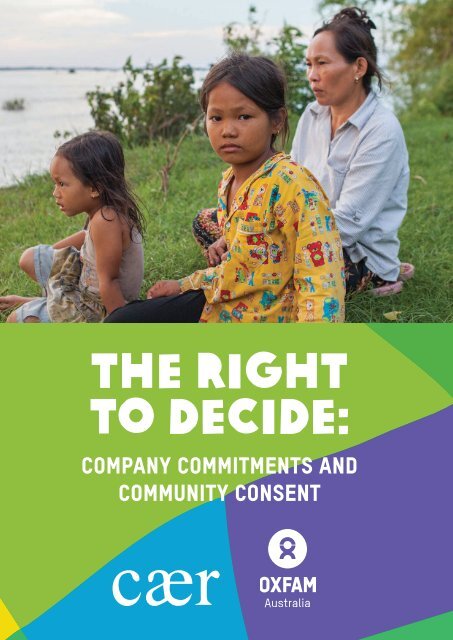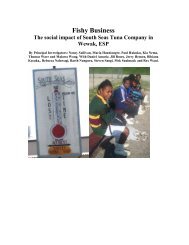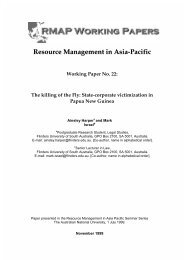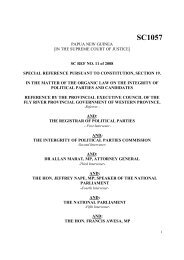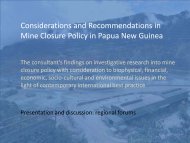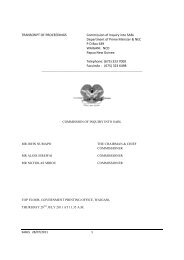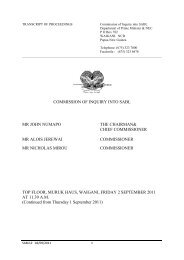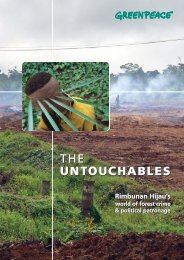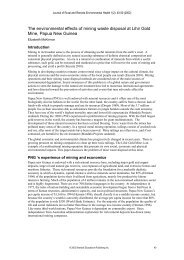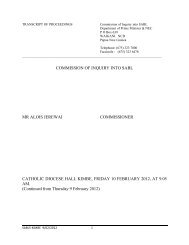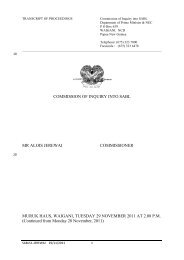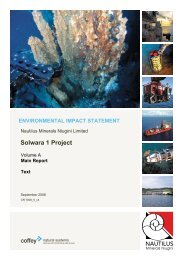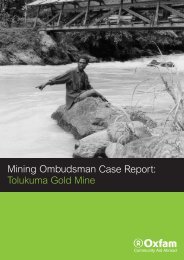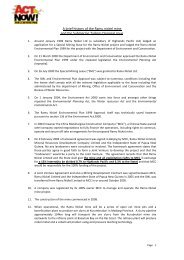Oxfam Australia and CAER: The right to decide
Oxfam Australia and CAER: The right to decide
Oxfam Australia and CAER: The right to decide
Create successful ePaper yourself
Turn your PDF publications into a flip-book with our unique Google optimized e-Paper software.
<strong>The</strong> <strong>right</strong><br />
<strong>to</strong> <strong>decide</strong>:<br />
company commitments <strong>and</strong><br />
community consent
<strong>CAER</strong><br />
PO Box 229Belconnen, ACT 2616<strong>Australia</strong><br />
Tel: +61 2 6201 1900<br />
Fax: +61 2 6201 1987<br />
Email: contact@caer.org.au<br />
www.caer.org.au<br />
Published May 2013<br />
Authors: Christina Hill (<strong>Oxfam</strong> <strong>Australia</strong>), Julia Leske (<strong>CAER</strong>)<br />
<strong>and</strong> Serena Lillywhite (<strong>Oxfam</strong> <strong>Australia</strong>)<br />
Contribu<strong>to</strong>rs: Duncan Paterson (<strong>CAER</strong>)<br />
Edi<strong>to</strong>r: Marian Reid<br />
Designer: Morgan White<br />
Proofreader: Meabh Friel<br />
Print production: Jocelyn Tan<br />
Acknowledgements<br />
<strong>CAER</strong> <strong>and</strong> <strong>Oxfam</strong> <strong>Australia</strong> would like <strong>to</strong> acknowledge <strong>and</strong><br />
thank Dr. Cathal Doyle (Middlesex University School of Law)<br />
<strong>and</strong> Michael Simon (<strong>Oxfam</strong> <strong>Australia</strong>) for peer reviewing this<br />
report. <strong>The</strong>ir insights <strong>and</strong> advice were very valuable.<br />
<strong>Oxfam</strong> <strong>Australia</strong><br />
132 Leicester Street, Carl<strong>to</strong>n VIC 3053 <strong>Australia</strong><br />
Tel: +61 3 9289 9444<br />
Fax: +61 3 9347 1983<br />
www.oxfam.org.au<br />
© <strong>CAER</strong> <strong>and</strong> <strong>Oxfam</strong> <strong>Australia</strong> 2013<br />
<strong>Oxfam</strong> <strong>Australia</strong> is affiliated with the <strong>Australia</strong>n Council for<br />
International Development (ACFID), by whose code of ethics<br />
we are bound; <strong>Oxfam</strong> International, by whose constitution<br />
<strong>and</strong> code of conduct we are bound; People in Aid, by whose<br />
code we are bound; <strong>and</strong> the Refugee Council of <strong>Australia</strong>.<br />
This report is available online at www.caer.org.au <strong>and</strong><br />
www.oxfam.org.au/explore/mining<br />
Cover pho<strong>to</strong>: Timothy Herbert/<strong>Oxfam</strong>AUS.<br />
This page: Claire Spoors/<strong>Oxfam</strong>AUS.
0. executive summary ............................................................................................................ 2<br />
1. Introduction ....................................................................................................................... 4<br />
2. mining <strong>and</strong> free, prior <strong>and</strong> informed consent — legal <strong>and</strong> policy perspectives ........ 5<br />
3. <strong>Australia</strong>n mining company commitments <strong>to</strong> Free, Prior <strong>and</strong> Informed Consent ....... 10<br />
4. Conclusion <strong>and</strong> recommendations ...................................................................................17<br />
Appendix 1 — methodology ....................................................................................................18<br />
Appendix 2 — glossary .........................................................................................................20<br />
1
0. executive summary<br />
This report examines the publicly stated positions of <strong>Australia</strong>n mining companies, <strong>and</strong> some <strong>Australia</strong>n oil <strong>and</strong> gas<br />
companies, in relation <strong>to</strong> the <strong>right</strong>s of indigenous peoples <strong>to</strong> participate in decision-making that affects them, their l<strong>and</strong> <strong>and</strong><br />
their natural resources. In particular we assess whether companies recognise the <strong>right</strong> of indigenous peoples <strong>to</strong> give or deny<br />
their Free, Prior <strong>and</strong> Informed Consent (FPIC) for mining projects on their l<strong>and</strong>.<br />
<strong>The</strong> United Nations Declaration on the Rights of Indigenous Peoples (UNDRIP) promotes the <strong>right</strong> of indigenous peoples <strong>to</strong><br />
give or deny their FPIC for projects that affect them, their l<strong>and</strong> <strong>and</strong> their natural resources. FPIC is both a <strong>right</strong> in itself, <strong>and</strong><br />
can help protect other human <strong>right</strong>s including <strong>right</strong>s <strong>to</strong> property, culture, religion, livelihood, health <strong>and</strong> physical wellbeing.<br />
Companies have the responsibility <strong>to</strong> respect all internationally recognised human <strong>right</strong>s, including the <strong>right</strong> of indigenous<br />
peoples <strong>to</strong> FPIC.<br />
Indigenous peoples’ <strong>right</strong>s, <strong>and</strong> their <strong>right</strong> <strong>to</strong> FPIC, are a critical issue for the <strong>Australia</strong>n mining industry. <strong>Australia</strong>n companies<br />
are not only trying <strong>to</strong> access minerals on indigenous peoples’ l<strong>and</strong> here in <strong>Australia</strong> but are also increasingly venturing<br />
overseas <strong>to</strong> do the same. <strong>The</strong> <strong>Australia</strong>n mining sec<strong>to</strong>r — like the global mining sec<strong>to</strong>r — is facing growing calls from<br />
indigenous peoples <strong>to</strong> respect their <strong>right</strong> <strong>to</strong> l<strong>and</strong> <strong>and</strong> their <strong>right</strong> <strong>to</strong> determine what happens on it.<br />
Companies face potential legal, reputational <strong>and</strong> financial risks if they attempt <strong>to</strong> operate without the consent of the<br />
indigenous peoples whose l<strong>and</strong> is at issue. Despite this, very few <strong>Australia</strong>n companies respect the <strong>right</strong> of indigenous<br />
peoples <strong>to</strong> give or deny their FPIC for projects on their l<strong>and</strong>. In fact, few companies make any public commitment <strong>to</strong> respect<br />
either human <strong>right</strong>s or indigenous peoples’ <strong>right</strong>s.<br />
<strong>The</strong> research for this study finds that:<br />
1. less than 25% of the 53 ASX 200 extractive companies considered in this report have a public statement respecting the<br />
<strong>right</strong>s of indigenous peoples;<br />
2. only two companies have a public commitment <strong>to</strong> adhere <strong>to</strong> the UNDRIP or ILO Indigenous <strong>and</strong> Tribal Peoples Convention<br />
169 (ILO 169) (which are the key internationally recognised instruments for indigenous peoples’ <strong>right</strong>s), <strong>and</strong> only one<br />
company has a public commitment <strong>to</strong> FPIC;<br />
3. half of the companies reviewed for this report have not met a single indica<strong>to</strong>r examined for this report. <strong>The</strong>se indica<strong>to</strong>rs<br />
relate <strong>to</strong> strategy <strong>and</strong> responsibility, engagement <strong>and</strong> consent, <strong>and</strong> reporting <strong>and</strong> dialogue; 1<br />
4. while extractive companies operating in <strong>Australia</strong> are required <strong>to</strong> undertake cultural heritage surveys, only 10 of the<br />
companies in this study have disclosed details of where they have undertaken broader social impact studies, that<br />
examine their impacts on indigenous peoples;<br />
5. one quarter of companies have had indigenous peoples’ groups or NGOs allege that they have negatively impacted<br />
on the <strong>right</strong>s of indigenous peoples. Only half of these companies have publicly acknowledged or responded <strong>to</strong><br />
these allegations; <strong>and</strong><br />
6. less than 5% of companies considered in this study have disclosed detailed examples of how they engage with<br />
indigenous peoples. Issues such as meaningful <strong>and</strong> ongoing consultation, provision of grievance mechanisms, policies on<br />
resettlement <strong>and</strong> compensation or reporting of incidents of non-compliances had similarly low rates of disclosure.<br />
1. Examples of what these indica<strong>to</strong>rs contain include company commitments <strong>to</strong> human <strong>right</strong>s <strong>and</strong> indigenous peoples’ <strong>right</strong>s, meaningful participation <strong>and</strong> ongoing<br />
consultation with indigenous peoples, undertaking Indigenous Impact Assessments, reporting on engagement activities, <strong>and</strong> disclosing incidents of non-compliance <strong>and</strong><br />
remedial action taken.<br />
2
It is recommended that <strong>Australia</strong>n mining, oil <strong>and</strong> gas companies:<br />
1. Develop <strong>and</strong> implement an indigenous peoples’ <strong>right</strong>s policy that is based on the UNDRIP <strong>and</strong> IL0 169, <strong>and</strong> that is<br />
consistent with the UN Guiding Principles on Business <strong>and</strong> Human Rights. This policy may be included within a broader<br />
human <strong>right</strong>s policy but should include specific commitments regarding indigenous peoples’ <strong>right</strong>s.<br />
2. Make explicit commitments <strong>to</strong> respect the <strong>right</strong> of indigenous peoples <strong>to</strong> give or deny their FPIC for extractive industries<br />
projects on their l<strong>and</strong>. This commitment <strong>to</strong> FPIC must apply <strong>to</strong> company operations both within <strong>Australia</strong> <strong>and</strong> overseas,<br />
<strong>and</strong> must commit <strong>to</strong> obtaining FPIC at all stages of the project cycle (exploration, construction, operation <strong>and</strong> closure).<br />
3. Disclose indigenous peoples <strong>right</strong>s <strong>and</strong> broader human <strong>right</strong>s policies, ensuring that potentially affected indigenous<br />
peoples can access these policies.<br />
4. Undertake Indigenous Impact Assessments — either as part of a broader human <strong>right</strong>s impact assessment or a st<strong>and</strong>alone<br />
assessment — that involves the participation of affected indigenous peoples.<br />
5. Commit <strong>to</strong> meaningful consultation <strong>and</strong> engagement with, <strong>and</strong> support the participation of, indigenous people <strong>and</strong><br />
other affected people in project decision-making. This must include ensuring the involvement of women, based on the<br />
principles of gender equality <strong>and</strong> non-discrimination.<br />
6. Establish grievance mechanisms designed <strong>to</strong> address the concerns of indigenous peoples, <strong>and</strong> other project-affected<br />
people, <strong>and</strong> remedy any adverse impacts which companies may have caused or contributed <strong>to</strong>. Grievance mechanisms<br />
must be legitimate, accessible, predictable, equitable, <strong>right</strong>s-compatible, transparent, <strong>and</strong> be based on dialogue <strong>and</strong><br />
engagement.<br />
7. Report on company engagement with indigenous peoples, how it manages grievances <strong>and</strong> concerns raised by indigenous<br />
peoples, <strong>and</strong> any allegations or violations of indigenous peoples’ <strong>right</strong>s.<br />
8. Learn from their experience of implementing FPIC, <strong>and</strong> share these lessons with others in the mining, oil <strong>and</strong> gas industry<br />
<strong>to</strong> improve the industry policy commitment <strong>to</strong> FPIC as well as implementation <strong>and</strong> practice.<br />
It is also recommended that:<br />
9. Project financiers <strong>and</strong> inves<strong>to</strong>rs recognise the <strong>right</strong> of indigenous peoples <strong>to</strong> FPIC, <strong>and</strong> work with mining, oil <strong>and</strong> gas<br />
companies <strong>to</strong> implement the recommendations above.<br />
10. <strong>The</strong> <strong>Australia</strong>n Government clarify its expectations of <strong>Australia</strong>n mining, oil <strong>and</strong> gas companies with regards <strong>to</strong> indigenous<br />
peoples’ <strong>right</strong>s <strong>and</strong> support the industry <strong>to</strong> implement the recommendations made above.<br />
FPIC is necessary <strong>to</strong> guarantee that the negative impacts of mining will be avoided, <strong>and</strong> that indigenous peoples’ economic,<br />
social <strong>and</strong> cultural <strong>right</strong>s will be protected in situations where mining projects are operating on or near indigenous l<strong>and</strong>.<br />
Genuine respect for the requirement for FPIC of indigenous peoples would undoubtedly have a transformative effect on the<br />
industry <strong>and</strong> its relationship with indigenous peoples.<br />
3
1. Introduction<br />
<br />
“<strong>The</strong> implementation of natural resource extraction<br />
<strong>and</strong> other development projects on or near indigenous<br />
terri<strong>to</strong>ries has become one of the foremost concerns of<br />
indigenous peoples worldwide, <strong>and</strong> possibly also the most<br />
pervasive source of the challenges <strong>to</strong> the full exercise<br />
of their <strong>right</strong>s … [<strong>The</strong>re is] a clear underst<strong>and</strong>ing [among<br />
stakeholders] of the negative <strong>and</strong> even catastrophic<br />
effects on the economic, social <strong>and</strong> cultural <strong>right</strong>s of<br />
indigenous peoples due <strong>to</strong> irresponsible or negligent<br />
projects that have been or are being implemented in<br />
indigenous terri<strong>to</strong>ries without proper guarantees or the<br />
involvement of the peoples concerned”.<br />
James Anaya, Special Rapporteur on the <strong>right</strong>s of<br />
indigenous peoples 2<br />
This report examines the publicly stated positions of<br />
<strong>Australia</strong>n mining companies, <strong>and</strong> some oil <strong>and</strong> gas<br />
companies, in relation <strong>to</strong> the <strong>right</strong>s of indigenous peoples <strong>to</strong><br />
participate in decision-making that affects them, their l<strong>and</strong><br />
<strong>and</strong> their natural resources. In particular we assess whether<br />
companies recognise the <strong>right</strong> of indigenous peoples <strong>to</strong><br />
give or deny their Free, Prior <strong>and</strong> Informed Consent (FPIC) for<br />
mining projects on their l<strong>and</strong>.<br />
This is a critical issue for the <strong>Australia</strong>n mining industry.<br />
<strong>Australia</strong>n companies are not only trying <strong>to</strong> access minerals<br />
on indigenous peoples’ l<strong>and</strong> here in <strong>Australia</strong> but are<br />
also increasingly venturing overseas <strong>to</strong> do the same. <strong>The</strong><br />
<strong>Australia</strong>n mining sec<strong>to</strong>r — like the global mining sec<strong>to</strong>r — is<br />
facing growing calls from indigenous peoples <strong>to</strong> respect their<br />
<strong>right</strong>s <strong>to</strong> l<strong>and</strong> <strong>and</strong> their <strong>right</strong> <strong>to</strong> determine what happens on<br />
it. Communities potentially impacted by mining, including<br />
indigenous <strong>and</strong> non-indigenous peoples, know their <strong>right</strong>s<br />
<strong>and</strong> are dem<strong>and</strong>ing that their <strong>right</strong>s are respected. 3 Without<br />
the consent of affected people, mining companies will find it<br />
more <strong>and</strong> more difficult <strong>to</strong> access l<strong>and</strong> for mine development<br />
<strong>and</strong> operation. Further, mining, oil <strong>and</strong> gas projects risk being<br />
delayed or shut down if communities directly impacted are<br />
not involved in project decision-making <strong>and</strong> if projects go<br />
ahead without their consent, or if affected people are denied<br />
opportunity <strong>to</strong> share in the benefits from these projects.<br />
Mining projects can impact on indigenous women <strong>and</strong> men<br />
in many <strong>and</strong> often harmful ways. <strong>The</strong> Special Rapporteur<br />
on the <strong>right</strong>s of indigenous peoples conducted a survey 4<br />
<strong>to</strong> underst<strong>and</strong> concerns relating <strong>to</strong> extractive industries<br />
operating on or near indigenous terri<strong>to</strong>ries, <strong>and</strong> found that<br />
mining projects can result in the following:<br />
• loss of control over indigenous l<strong>and</strong>s, terri<strong>to</strong>ries <strong>and</strong><br />
natural resources;<br />
• degradation <strong>and</strong> destruction of ecosystems <strong>and</strong> resulting<br />
devastating effects on indigenous peoples’ subsistence<br />
economies which are closely linked <strong>to</strong> these ecosystems;<br />
• water resource depletion <strong>and</strong> contamination which has<br />
harmful effects on the availability of water for drinking,<br />
farming, grazing cattle <strong>and</strong> fishing;<br />
• deterioration of health from water <strong>and</strong> air pollution, threats<br />
<strong>to</strong> food security <strong>and</strong> increased malnutrition;<br />
• adverse impacts on social structures <strong>and</strong> indigenous<br />
culture, including declines in community social cohesion<br />
<strong>and</strong> the erosion of traditional decision-making structures<br />
— this is often felt most by indigenous women who can<br />
experience loss of social, economic <strong>and</strong> decision-making<br />
power when removed from their traditional l<strong>and</strong>-based<br />
occupations; <strong>and</strong><br />
• destruction of places of cultural <strong>and</strong> spiritual significance.<br />
Finally, indigenous peoples reported that the benefits from<br />
mining projects are often limited in scope <strong>and</strong> do not make<br />
up for the many problems associated with the projects.<br />
Furthermore, where <strong>right</strong>s are violated as a result of mining<br />
projects, compensation mechanisms tend <strong>to</strong> be inadequate<br />
<strong>and</strong> culturally inappropriate.<br />
<strong>The</strong>se frequently devastating impacts are symp<strong>to</strong>matic of<br />
a model of extractive industry engagement with indigenous<br />
peoples which is fundamentally at odds with the realisation<br />
of their <strong>right</strong> <strong>to</strong> self-determination.<br />
FPIC is the minimum st<strong>and</strong>ard for the involvement of<br />
indigenous peoples in decision-making processes about<br />
large-scale projects. FPIC entitles indigenous peoples <strong>to</strong><br />
determine the outcome of decision-making that affects them<br />
— it is not merely a <strong>right</strong> <strong>to</strong> be consulted about projects that<br />
others will ultimately make decisions on. FPIC is necessary<br />
<strong>to</strong> guarantee that the negative impacts of mining will be<br />
avoided, <strong>and</strong> that indigenous peoples’ economic, social <strong>and</strong><br />
cultural <strong>right</strong>s will be protected in situations where mining<br />
projects are operating on or near indigenous l<strong>and</strong>.<br />
This report also describes FPIC <strong>and</strong> its legal basis in<br />
international law, its value in protecting other human <strong>right</strong>s,<br />
<strong>and</strong> recent global developments on FPIC by a range of<br />
stakeholders.<br />
<strong>The</strong> report concludes by calling on the <strong>Australia</strong>n mining<br />
industry <strong>to</strong> strengthen its commitment <strong>to</strong> the <strong>right</strong>s of<br />
indigenous peoples, in particular indigenous peoples’ <strong>right</strong>s<br />
<strong>to</strong> give or deny FPIC for mining projects on their l<strong>and</strong>. This<br />
call is made in the context of an improved underst<strong>and</strong>ing by<br />
many in the <strong>Australia</strong>n mining industry of its responsibility<br />
<strong>to</strong> respect human <strong>right</strong>s more broadly. This is a good <strong>and</strong><br />
necessary basis on which <strong>to</strong> take the next step.<br />
2. Report of the Special Rapporteur on the <strong>right</strong>s of indigenous peoples, James Anaya, ‘Extractive industries operating within or near indigenous terri<strong>to</strong>ries’, A/HRC/18/35,<br />
11 July 2011.<br />
3. <strong>Oxfam</strong> <strong>Australia</strong>’s Guide <strong>to</strong> Free, Prior <strong>and</strong> Informed Consent, June 2010, is an example of how communities are improving their underst<strong>and</strong>ing of FPIC.<br />
4. Report of the Special Rapporteur on the <strong>right</strong>s of indigenous peoples, James Anaya, ‘Extractive industries operating within or near indigenous terri<strong>to</strong>ries’, A/HRC/18/35,<br />
11 July 2011.<br />
4
2. mining <strong>and</strong> free,<br />
prior <strong>and</strong> informed consent —<br />
legal <strong>and</strong> policy perspectives<br />
<strong>The</strong> United Nations Declaration on the Rights of Indigenous<br />
Peoples (UNDRIP) 5 promotes the <strong>right</strong> of indigenous peoples<br />
<strong>to</strong> give or deny their Free, Prior <strong>and</strong> Informed Consent (FPIC)<br />
for projects that affect them, their l<strong>and</strong> <strong>and</strong> their natural<br />
resources. <strong>The</strong> UNDRIP requires that the FPIC of indigenous<br />
peoples be obtained in matters of fundamental importance<br />
for their <strong>right</strong>s, survival, dignity <strong>and</strong> wellbeing. 6<br />
<strong>The</strong> <strong>right</strong> <strong>to</strong> FPIC is also articulated in ILO Indigenous <strong>and</strong><br />
Tribal Peoples Convention 169 (ILO 169) 7 which deals with the<br />
<strong>right</strong>s of indigenous <strong>and</strong> tribal peoples. It is also affirmed<br />
in the jurisprudence of international <strong>and</strong> regional human<br />
<strong>right</strong>s bodies, which have interpreted the major human <strong>right</strong>s<br />
treaties as embodying the requirement for FPIC in relation <strong>to</strong><br />
mining projects on the terri<strong>to</strong>ry of indigenous peoples.<br />
In the case of mining, the UNDRIP says: “States shall consult<br />
<strong>and</strong> cooperate in good faith with the indigenous peoples<br />
concerned through their own representative institutions in<br />
order <strong>to</strong> obtain their free <strong>and</strong> informed consent prior <strong>to</strong> the<br />
approval of any project affecting their l<strong>and</strong>s or terri<strong>to</strong>ries<br />
<strong>and</strong> other resources, particularly in connection with the<br />
development, utilisation or exploitation of mineral, water or<br />
other resources.” 8<br />
However, FPIC is not only a concern for states (although<br />
it must be acknowledged that some states do not even<br />
recognise the status of some people as indigenous).<br />
Companies must also respect this <strong>right</strong>. <strong>The</strong> responsibility of<br />
companies <strong>to</strong> respect all internationally recognised human<br />
<strong>right</strong>s is articulated in various human <strong>right</strong>s instruments,<br />
including the United Nations Protect, Respect <strong>and</strong> Remedy<br />
Framework, 9 which is the global st<strong>and</strong>ard of expected<br />
conduct for all businesses wherever they operate. This<br />
corporate responsibility <strong>to</strong> respect indigenous peoples’<br />
internationally recognised <strong>right</strong>s exists in addition <strong>to</strong> the<br />
state responsibility <strong>to</strong> guarantee their protection.<br />
Other stakeholders also recognise the <strong>right</strong> of indigenous<br />
peoples <strong>to</strong> FPIC. <strong>The</strong> World Bank’s private sec<strong>to</strong>r arm, the<br />
International Finance Corporation (IFC), for example, now<br />
requires its clients <strong>to</strong> obtain the FPIC of affected indigenous<br />
peoples in some circumstances, including when a project<br />
may result in adverse impacts <strong>and</strong> when the relocation of<br />
indigenous peoples from communal l<strong>and</strong> is unavoidable. 10<br />
<strong>The</strong> circumstances elaborated clearly extend <strong>to</strong> mining<br />
projects in or near indigenous peoples’ terri<strong>to</strong>ries. <strong>The</strong> IFC<br />
sets the st<strong>and</strong>ard for the Equa<strong>to</strong>r Principles Banks, <strong>and</strong><br />
influences other st<strong>and</strong>ards such as the OECD Guidelines<br />
for Multinational Enterprises <strong>and</strong> the lending practices of<br />
some export credit agencies such as <strong>Australia</strong>’s Export<br />
Finance <strong>and</strong> Insurance Corporation. As the IFC itself has<br />
said, increasingly other international finance institutions,<br />
industry associations <strong>and</strong> round tables have adopted or are<br />
considering adopting FPIC. 11<br />
Research undertaken by <strong>Oxfam</strong> America shows that some<br />
non-<strong>Australia</strong>n multinational mining, oil <strong>and</strong> gas companies<br />
also make explicit commitments <strong>to</strong> FPIC. 12<br />
<strong>The</strong> <strong>right</strong> <strong>to</strong> FPIC must be unders<strong>to</strong>od within the broader<br />
context of the <strong>right</strong>s of indigenous peoples <strong>to</strong> maintain <strong>and</strong><br />
strengthen their own institutions, cultures <strong>and</strong> traditions,<br />
<strong>and</strong> <strong>to</strong> pursue their development in keeping with their own<br />
needs <strong>and</strong> aspirations. 13 Additionally, indigenous peoples’<br />
<strong>right</strong> <strong>to</strong> FPIC is based on their <strong>right</strong> <strong>to</strong> self-determination.<br />
FPIC is an essential safeguard for the realisation of selfdetermined<br />
development in the social, cultural <strong>and</strong> economic<br />
spheres.<br />
Indigenous peoples’ collective <strong>right</strong> <strong>to</strong> FPIC is an example of<br />
a specific <strong>right</strong> of indigenous peoples but one that is based<br />
on universal <strong>right</strong>s, including those in the International<br />
Covenant on Economic, Social <strong>and</strong> Cultural Rights <strong>and</strong><br />
International Covenant on Civil <strong>and</strong> Political Rights. FPIC<br />
recognises indigenous peoples’ specific <strong>right</strong> <strong>to</strong> l<strong>and</strong> <strong>and</strong><br />
the cultural significance of l<strong>and</strong>, as well as a his<strong>to</strong>rical lack<br />
of participation in decision-making by indigenous peoples<br />
<strong>and</strong> their political marginalisation. It is also, as noted above,<br />
a fundamental element of their <strong>right</strong> as peoples <strong>to</strong> selfdetermination.<br />
FPIC requires that indigenous peoples <strong>and</strong> local communities<br />
must be adequately informed about mining, oil <strong>and</strong> gas<br />
projects in a timely manner, <strong>and</strong> given the opportunity <strong>to</strong><br />
approve (or reject) projects prior <strong>to</strong> the commencement<br />
of operations. This includes participation in setting the<br />
terms <strong>and</strong> conditions that address the economic, social<br />
<strong>and</strong> environmental impacts of all phases of extraction <strong>and</strong><br />
post-extraction operations. 14 FPIC is a specific <strong>right</strong> held by<br />
indigenous peoples only. However, it also represents bestpractice<br />
sustainable development <strong>and</strong> should therefore<br />
guide mining, oil <strong>and</strong> gas company practice when consulting<br />
<strong>and</strong> negotiating with all affected communities — both<br />
indigenous <strong>and</strong> non-indigenous.<br />
5. <strong>The</strong> UNDRIP is an important human <strong>right</strong>s instrument even though it is not legally binding. <strong>The</strong> UNDRIP represents the commitment of governments <strong>to</strong> abide by certain<br />
principles <strong>and</strong> st<strong>and</strong>ards, is based on human <strong>right</strong>s enshrined in other legally binding instruments <strong>and</strong> represents the aspirations of indigenous peoples globally.<br />
6. Expert Mechanism Advice No. 2, 2011: Indigenous peoples <strong>and</strong> the <strong>right</strong> <strong>to</strong> participate in decision-making.<br />
7. www.ilo.org/indigenous/Conventions/no169/lang--en/index.htm<br />
8. United Nations Declaration on the Rights of Indigenous Peoples, article 32(2)<br />
9. www.reports-<strong>and</strong>-materials.org/Ruggie-report-7-Apr-2008.pdf<br />
10. International Finance Corporation, Performance St<strong>and</strong>ard 7 Indigenous Peoples, January 2012.<br />
11. International Finance Corporation, Progress report on IFC’s policy <strong>and</strong> performance st<strong>and</strong>ards on social <strong>and</strong> environmental sustainability, <strong>and</strong> Access <strong>to</strong> Information Policy<br />
review <strong>and</strong> update process, December 2010.<br />
12. Marianne Voss <strong>and</strong> Emily Greenspan, ‘Community consent index: Oil, gas <strong>and</strong> mining company public positions on Free, Prior, <strong>and</strong> Informed Consent (FPIC)’, <strong>Oxfam</strong> America<br />
Research Backgrounder series, 2012.<br />
13. Frequently asked questions: Declaration on the Rights of Indigenous Peoples: www.un.org/esa/socdev/unpfii/documents/FAQsindigenousdeclaration.pdf<br />
14. Marianne Voss <strong>and</strong> Emily Greenspan, ‘Community consent index: Oil, gas <strong>and</strong> mining company public positions on Free, Prior, <strong>and</strong> Informed Consent (FPIC)’, <strong>Oxfam</strong> America<br />
Research Backgrounder series, 2012.<br />
5
An inves<strong>to</strong>r perspective<br />
Without properly managing relations with indigenous peoples, companies run the risk of losing inves<strong>to</strong>r support.<br />
<strong>Australia</strong>n Ethical Investment’s Chief Investment Officer David Macri talks about why FPIC is an important issue,<br />
not only from an ethical point of view but also because it makes good business sense.<br />
At <strong>Australia</strong>n Ethical, indigenous <strong>right</strong>s, including the <strong>right</strong> <strong>to</strong> FPIC are an integral part of our investment approach.<br />
While we are not big inves<strong>to</strong>rs in the extractives sec<strong>to</strong>r, from time-<strong>to</strong>-time we do come across projects where FPIC<br />
is relevant. <strong>The</strong> <strong>Australia</strong>n Ethical Charter (www.australianethical.com.au/ethical-charter) is a public statement of<br />
our investment ethics, <strong>and</strong> the human <strong>right</strong>s of indigenous peoples are clearly identified as something we consider.<br />
It’s not only good sense from an ethical point of view, we believe that companies considering issues like FPIC<br />
ought <strong>to</strong> be achieving better financial outcomes in the long-term. <strong>The</strong>y will be exposed <strong>to</strong> fewer governance<br />
<strong>and</strong> project-related risks than operations that access indigenous l<strong>and</strong> without consent from traditional owners.<br />
Without consent, projects may be delayed or disrupted, adding unforeseen costs. In extreme cases projects could<br />
be shut down, with investment costs sunk without providing returns. Companies complicit in human <strong>right</strong>s abuses<br />
may face legal challenges or suffer reputational risks, which in turn impacts on their licence <strong>to</strong> operate for current<br />
<strong>and</strong> future projects. Litigation <strong>and</strong> damage <strong>to</strong> a reputation can take many years <strong>to</strong> resolve, <strong>and</strong> will tie up large<br />
amounts of resources <strong>and</strong> management time.<br />
From a regula<strong>to</strong>ry perspective, governments have started <strong>to</strong> look at the issue of FPIC as well. Examples include the<br />
Indigenous Peoples Rights Act in the Philippines <strong>and</strong> the Northern Terri<strong>to</strong>ry’s Aboriginal L<strong>and</strong> Rights Act.<br />
A his<strong>to</strong>ry of poor management of projects on indigenous l<strong>and</strong> can also result in project financiers increasing the<br />
costs of a company’s access <strong>to</strong> capital. Examples of project finance conditions include International Finance<br />
Corporation safeguards which also are the basis for the Equa<strong>to</strong>r Principles. Many financial institutions providing<br />
financial support or guarantees have committed <strong>to</strong> the Equa<strong>to</strong>r Principles.<br />
Inves<strong>to</strong>rs are becoming savvy when deciding where they put their money, <strong>and</strong> key human <strong>right</strong>s principles such as<br />
FPIC will increasingly play a role in where they choose <strong>to</strong> invest. Companies that are managing their relations with<br />
indigenous communities well are more likely <strong>to</strong> be socially, environmentally <strong>and</strong> financially sustainable.<br />
David Macri<br />
Chief Investment Officer, <strong>Australia</strong>n Ethical Investment<br />
6
Further guidance is provided by the Expert Mechanism on the<br />
Rights of Indigenous Peoples who defines FPIC as follows: 15<br />
• “Free” implies no coercion, intimidation or manipulation.<br />
• “Prior” implies that consent is obtained in advance of the<br />
activity associated with the decision being made, <strong>and</strong><br />
includes the time necessary <strong>to</strong> allow indigenous peoples <strong>to</strong><br />
undertake their own decision-making processes.<br />
• “Informed” implies that indigenous peoples have been<br />
provided all information relating <strong>to</strong> the activity <strong>and</strong> that<br />
the information is objective, accurate <strong>and</strong> presented in a<br />
manner <strong>and</strong> form underst<strong>and</strong>able <strong>to</strong> indigenous peoples.<br />
• “Consent” implies that indigenous peoples have agreed<br />
<strong>to</strong> the activity that is the subject of the relevant decision,<br />
which may also be subject <strong>to</strong> conditions.<br />
In 2003, the UN Special Rapporteur on the situation of human<br />
<strong>right</strong>s <strong>and</strong> fundamental freedoms of indigenous peoples<br />
clarified that this includes “the <strong>right</strong> <strong>to</strong> say No”. 16<br />
<strong>The</strong> elements of FPIC are interrelated, <strong>and</strong> set the conditions<br />
for the consent of indigenous peoples. <strong>The</strong> “free”, “prior” <strong>and</strong><br />
“informed” ensure a fair consent process. Violation of any of<br />
these three elements may invalidate any agreement said <strong>to</strong><br />
have been made between extractive industry companies <strong>and</strong><br />
indigenous peoples.<br />
FPIC requires respect for both traditional <strong>and</strong> contemporary<br />
representative structures, <strong>and</strong> the cus<strong>to</strong>mary laws <strong>and</strong><br />
practices of communities including their collective decisionmaking<br />
practices. FPIC processes must also involve the<br />
participation of both indigenous women <strong>and</strong> men. <strong>The</strong> <strong>right</strong><br />
<strong>to</strong> FPIC (<strong>and</strong> <strong>to</strong> participate in community decision-making<br />
processes) is not one held by men only. Women have equal<br />
<strong>right</strong>s, 17 including <strong>to</strong> participate in community decisionmaking<br />
processes, <strong>to</strong> benefit from development <strong>and</strong> <strong>to</strong> be<br />
safe from the potential negative impacts of mining. Yet<br />
it must be acknowledged that indigenous women often<br />
face exceptional impediments <strong>to</strong> participation in decisionmaking.<br />
18 Any supposed justifications based on culture<br />
for the exclusion of indigenous women is not consistent<br />
with international human <strong>right</strong>s st<strong>and</strong>ards <strong>and</strong> must be<br />
challenged — within many indigenous communities, women<br />
have (or traditionally had) important decision-making roles.<br />
Mining companies should not condone, <strong>to</strong>lerate or perpetuate<br />
discrimination against women, <strong>and</strong> should work <strong>to</strong> avoid the<br />
gendered impacts of mining 19 by ensuring the involvement<br />
of indigenous women in FPIC processes. This is best done<br />
by acknowledging <strong>and</strong> supporting the efforts of indigenous<br />
women <strong>to</strong> operationalise consent in a manner consistent<br />
with the <strong>right</strong>s of all members of their community. It should<br />
also be indigenous women (not the imposition of others)<br />
who <strong>decide</strong> how <strong>and</strong> when they should participate in<br />
decision-making processes, as well as their involvement in<br />
FPIC processes, based on the principles of equality, nondiscrimination<br />
<strong>and</strong> equity.<br />
<strong>The</strong> <strong>right</strong> <strong>to</strong> FPIC should be considered in the broader<br />
context of business <strong>and</strong> human <strong>right</strong>s. 20 <strong>The</strong> UN Protect,<br />
Respect <strong>and</strong> Remedy Framework on Business <strong>and</strong> Human<br />
Rights articulates the roles <strong>and</strong> responsibilities of both<br />
governments <strong>and</strong> businesses in relation <strong>to</strong> preventing <strong>and</strong><br />
addressing business-related human <strong>right</strong>s abuse. This<br />
framework has the support of governments, business <strong>and</strong><br />
civil society. It has three interlinked pillars:<br />
1. <strong>The</strong> state duty <strong>to</strong> protect against human <strong>right</strong>s abuses<br />
by third parties, including business, through appropriate<br />
policies, regulation <strong>and</strong> adjudication.<br />
2. <strong>The</strong> corporate responsibility <strong>to</strong> respect human <strong>right</strong>s,<br />
which means that businesses should act with due<br />
diligence <strong>to</strong> avoid infringing on the <strong>right</strong>s of others <strong>and</strong><br />
<strong>to</strong> address adverse impacts with which they are involved.<br />
3. <strong>The</strong> need for greater access by victims of businessrelated<br />
human <strong>right</strong>s abuse <strong>to</strong> effective remedy, both<br />
judicial <strong>and</strong> non-judicial.<br />
<strong>The</strong> UN Guiding Principles on Business <strong>and</strong> Human Rights 21<br />
developed <strong>to</strong> help support the Protect, Respect <strong>and</strong><br />
Remedy Framework explain that the corporate responsibility<br />
<strong>to</strong> respect human <strong>right</strong>s means business should avoid<br />
involvement in adverse human <strong>right</strong>s impacts, including<br />
through their business relationships. In other words,<br />
business should, as a minimum, do no harm. In practice this<br />
requires that businesses have a human <strong>right</strong>s policy that<br />
commits them <strong>to</strong> respect all human <strong>right</strong>s, implement a<br />
human <strong>right</strong>s due-diligence process <strong>to</strong> know <strong>and</strong> show that<br />
they are respecting human <strong>right</strong>s (requiring identification<br />
<strong>and</strong> assessment of impacts; integration of the findings of<br />
those assessments throughout corporate processes; <strong>and</strong><br />
tracking <strong>and</strong> communicating human <strong>right</strong>s performance),<br />
<strong>and</strong> work <strong>to</strong> remedy any adverse impacts they may have<br />
caused or contributed <strong>to</strong>, such as through a formal grievance<br />
mechanism.<br />
<strong>The</strong> state duty <strong>to</strong> protect, <strong>and</strong> corporate responsibility <strong>to</strong><br />
respect, relate <strong>to</strong> all internationally recognised human<br />
<strong>right</strong>s, including the <strong>right</strong>s of indigenous peoples. <strong>The</strong>re is<br />
no hierarchy of <strong>right</strong>s here — all human <strong>right</strong>s matter <strong>and</strong> all<br />
human <strong>right</strong>s require equal protection. <strong>The</strong>se <strong>right</strong>s include<br />
indigenous peoples’ <strong>right</strong>s over l<strong>and</strong> <strong>and</strong> natural resources,<br />
<strong>and</strong> <strong>to</strong> FPIC. Yet, as the Special Rapporteur has observed, 22<br />
there is a pervasive lack of underst<strong>and</strong>ing <strong>and</strong> conviction<br />
that the human <strong>right</strong>s that states must protect <strong>and</strong> business<br />
must respect includes the specific <strong>right</strong>s of indigenous<br />
peoples, especially those <strong>right</strong>s that are affirmed in the<br />
UNDRIP. This observation is confirmed by our research. As<br />
described in section three of this report, some <strong>Australia</strong>n<br />
mining companies do commit <strong>to</strong> respecting human <strong>right</strong>s or<br />
indigenous peoples’ <strong>right</strong>s but most s<strong>to</strong>p short of specifically<br />
recognising indigenous peoples’ <strong>right</strong>s <strong>to</strong> FPIC. This approach<br />
is inherently flawed as the respect for FPIC is necessary <strong>to</strong><br />
guarantee respect for indigenous peoples’ <strong>right</strong>s.<br />
15. Expert Mechanism Advice No. 2, 2011: Indigenous peoples <strong>and</strong> the <strong>right</strong> <strong>to</strong> participate in decision-making.<br />
16. Report of Special Rapporteur on the situation of human <strong>right</strong>s <strong>and</strong> fundamental freedoms of indigenous peoples, Stavenhagen 2003 UN Doc. E/CN.4/2003/90,<br />
paras 13 <strong>and</strong> 66.<br />
17. Convention on the Elimination of All Forms of Discrimination against Women.<br />
18. Final study on indigenous peoples <strong>and</strong> the <strong>right</strong> <strong>to</strong> participate in decision-making, Report of the Expert Mechanism on the Rights of Indigenous Peoples, A/HRC/<br />
EMRIP/2011/2, 26 May 2011.<br />
19. <strong>Oxfam</strong> <strong>Australia</strong>, Women, communities <strong>and</strong> mining: <strong>The</strong> gender impacts of mining <strong>and</strong> the role of gender impact assessment, 2009.<br />
20. Protect, Respect <strong>and</strong> Remedy: A framework for business <strong>and</strong> human <strong>right</strong>s, Report of the Special Representative of the Secretary-General on the issue of human <strong>right</strong>s <strong>and</strong><br />
transnational corporations <strong>and</strong> other business enterprises, A/HRC/8/5, 7 April 2008.<br />
21. www.ohchr.org/Documents/Publications/GuidingPrinciplesBusinessHR_EN.pdf<br />
22. Statement by James Anaya, Special Rapporteur on the <strong>right</strong>s of indigenous peoples, Forum on Business <strong>and</strong> Human Rights, 5 December 2012, Geneva.<br />
7
<strong>The</strong> mining <strong>and</strong> energy nexus: examples from the Asia Pacific region<br />
Mining, oil <strong>and</strong> gas companies are, in general, not directly involved in proposing or developing hydro generation<br />
of electricity. However, by requiring energy in remote areas — often in countries with limited grid connectivity —<br />
mining companies either inadvertently or directly put pressure on governments <strong>to</strong> incentivise the development<br />
of new energy sources, including large-scale hydro schemes. <strong>The</strong>se large-scale hydro schemes impact on<br />
indigenous peoples in many <strong>and</strong> often harmful ways.<br />
In the Mekong region the development of hydropower dams characterises the rapid expansion of economic<br />
growth; achieved in large part by the exploitation <strong>and</strong> commercialisation of the natural resource base. This region<br />
has more than 100 ethnic minority or indigenous peoples groups, <strong>and</strong> the expropriation of natural resources for<br />
hydropower <strong>and</strong> related industrial activities from local communities is largely occurring without their FPIC.<br />
<strong>The</strong> Mekong development model 23 anticipates cross-border regional grid connectivity linking growing urban<br />
markets with new sources of power. Included in this is the electricity connection from large hydropower dams<br />
<strong>to</strong> mining operations. Rural electrification is needed in most Mekong countries, yet the best way <strong>to</strong> deliver this is<br />
not large-scale hydropower but more decentralised <strong>and</strong> small-scale generation options. Economic development<br />
in many of the Mekong countries is putting pressure on electricity supplies but the primary drivers of energy<br />
development are not indigenous peoples. Local indigenous peoples are rarely represented in energy planning<br />
or decision-making in relation <strong>to</strong> energy or infrastructure.<br />
<strong>Australia</strong>n mining companies that have benefited from large hydro developments in the Asia-Pacific region include<br />
PanAust <strong>and</strong> Kingsgate Consolidated, which purchase hydro-generated electricity from the grids in Thail<strong>and</strong> <strong>and</strong><br />
Laos. Neither company is directly involved in the development of dams. <strong>The</strong>se companies typically state that<br />
their influence on how hydro projects are developed or operated is limited. Yet, companies have some obligations.<br />
<strong>The</strong> UN Guiding Principles on Business <strong>and</strong> Human Rights state clearly that business should seek <strong>to</strong> prevent<br />
adverse human <strong>right</strong>s impacts that are directly linked <strong>to</strong> their operations … even if they have not contributed <strong>to</strong><br />
those impacts.<br />
In Malaysia, Rio Tin<strong>to</strong> Alcan acknowledged its interest in ensuring human <strong>right</strong>s were respected in the development<br />
of a hydro dam that would have provided power <strong>to</strong> a smelter it was considering building in Sarawak (the project<br />
was cancelled in March 2012 due <strong>to</strong> failure <strong>to</strong> reach agreement on commercial terms for a long-term power supply<br />
contract). “While resettlement was not occurring where the smelter was <strong>to</strong> be located, Rio Tin<strong>to</strong> Alcan had an<br />
interest in ensuring that any resettlement linked <strong>to</strong> its operation was conducted according <strong>to</strong> international bestpractice<br />
<strong>and</strong> human <strong>right</strong>s due diligence. Rio Tin<strong>to</strong> Alcan needed <strong>to</strong> be aware of the full range of its business<br />
involvement, including the activities of the host government.” 24<br />
In Papua New Guinea, Origin Energy is developing the Purari Dam with most of the energy <strong>to</strong> be sent via under-sea<br />
cable <strong>to</strong> <strong>Australia</strong> <strong>to</strong> provide base-load power for minerals <strong>and</strong> other infrastructure development in Queensl<strong>and</strong>. 25<br />
Origin has stated a commitment <strong>to</strong> developing the dam with consideration of FPIC for local communities, but <strong>to</strong> do<br />
this meaningfully the process should include FPIC for communities at the dam site, downstream <strong>to</strong> the delta <strong>and</strong><br />
port system, <strong>and</strong> across <strong>to</strong> the <strong>Australia</strong>n mainl<strong>and</strong> where the cables will cut through indigenous l<strong>and</strong> in Cape York.<br />
We can start <strong>to</strong> see that some companies recognise the wider sphere of their influence <strong>and</strong> responsibility<br />
<strong>to</strong> ensure that projects along their value chain, including energy supply, are undertaken in accordance with<br />
international human <strong>right</strong>s st<strong>and</strong>ards.<br />
23. Most clearly characterised in the Asian Development Bank driven Greater Mekong Subregion (GMS) program.<br />
24. Rio Tin<strong>to</strong> guide for communities <strong>and</strong> social performance practitioners, Why human <strong>right</strong>s matter: www.riotin<strong>to</strong>.com/documents/ReportsPublications/Rio_Tin<strong>to</strong>_human_<br />
<strong>right</strong>s_guide_-_English_version.pdf<br />
25. www.originenergy.com.au/files/FactSheetPNGRenewableEnergyProject.pdf<br />
8
Reconciliation Action Plans<br />
Some <strong>Australia</strong>n companies have developed a<br />
Reconciliation Action Plan (RAP). <strong>The</strong>se plans<br />
document what the company would do <strong>to</strong> contribute<br />
<strong>to</strong> reconciliation in <strong>Australia</strong>. <strong>The</strong>y “outline practical<br />
actions the organisation will take <strong>to</strong> build strong<br />
relationships <strong>and</strong> enhanced respect between<br />
Aboriginal <strong>and</strong> Torres Strait Isl<strong>and</strong>er Peoples <strong>and</strong> other<br />
<strong>Australia</strong>ns. A RAP also sets out the organisation’s<br />
aspirational plans <strong>to</strong> drive greater equality by pursuing<br />
sustainable opportunities”. 26<br />
An assessment of companies’ publicly stated<br />
commitments indicates that of the extractive industry<br />
companies among the <strong>to</strong>p 200 companies listed on<br />
the <strong>Australia</strong>n Securities Exchange (ASX) only BHP<br />
Billi<strong>to</strong>n, Rio Tin<strong>to</strong> <strong>and</strong> Woodside Petroleum have RAPs.<br />
A RAP could be used by companies <strong>to</strong> outline how they<br />
respect <strong>and</strong> implement FPIC in <strong>Australia</strong> <strong>and</strong> may act as<br />
a useful starting point for implementing this st<strong>and</strong>ard<br />
across all of a company’s operations.<br />
Further, on numerous occasions, mining company<br />
representatives have said <strong>to</strong> <strong>Oxfam</strong> that while they respect<br />
human <strong>right</strong>s they do not support FPIC thus erroneously<br />
disconnecting indigenous peoples’ <strong>right</strong> <strong>to</strong> FPIC from other<br />
human <strong>right</strong>s.<br />
<strong>The</strong> <strong>right</strong> <strong>to</strong> FPIC is explicitly recognised in some national<br />
<strong>and</strong> state laws including in the Northern Terri<strong>to</strong>ry of <strong>Australia</strong>.<br />
Many <strong>Australia</strong>n mining companies would be familiar with<br />
these legislative requirements <strong>and</strong>, if they operate in the<br />
Northern Terri<strong>to</strong>ry, would comply with these requirements.<br />
In fact, there is much that companies can learn from existing<br />
legislation <strong>and</strong> associated practice in the Northern Terri<strong>to</strong>ry<br />
that they could implement (with adjustments as required) in<br />
their operations in other countries.<br />
<strong>Oxfam</strong> <strong>Australia</strong>’s report on FPIC in <strong>Australia</strong> 27 describes<br />
some of these lessons. Yet many mining companies<br />
do not go beyond compliance with national law once<br />
outside of <strong>Australia</strong> — even when operating in countries<br />
where indigenous peoples <strong>right</strong>s’ are poorly protected<br />
<strong>and</strong> the specific <strong>right</strong> <strong>to</strong> FPIC is not recognised by law.<br />
<strong>The</strong> corporate responsibility <strong>to</strong> respect human <strong>right</strong>s requires<br />
companies <strong>to</strong> go beyond compliance with national law.<br />
It requires them, as a minimum, <strong>to</strong> do no harm, <strong>and</strong> respect<br />
international st<strong>and</strong>ards.<br />
FPIC is both a <strong>right</strong> in itself <strong>and</strong> can also help protect<br />
other human <strong>right</strong>s including <strong>right</strong>s <strong>to</strong> property, culture,<br />
religion, livelihood, health <strong>and</strong> physical wellbeing. It must be<br />
recognised that mining has the potential <strong>to</strong> negatively impact<br />
these <strong>right</strong>s including, for example, when communities are<br />
forced <strong>to</strong> resettle <strong>to</strong> allow for the development of a mine.<br />
<strong>The</strong> Special Rapporteur on the <strong>right</strong>s of indigenous peoples<br />
has said that consent (<strong>and</strong> consultation) constitutes a<br />
special st<strong>and</strong>ard that safeguards <strong>and</strong> functions as a means<br />
for the exercise of indigenous peoples’ substantive <strong>right</strong>s. 28<br />
Other safeguards include human <strong>right</strong>s <strong>and</strong> gender impact<br />
assessments, plans <strong>to</strong> mitigate the potential negative<br />
impacts on indigenous peoples’ <strong>right</strong>s, fair benefit-sharing<br />
<strong>and</strong> compensation agreements, <strong>and</strong> <strong>right</strong>s-compatible<br />
grievance mechanisms.<br />
<strong>The</strong> many accusations of human <strong>right</strong>s abuse directed at<br />
the mining industry — <strong>and</strong> strong opposition <strong>to</strong> many mining<br />
projects — would not be nearly so high if mining projects are<br />
only developed when the consent of indigenous peoples is<br />
obtained. Companies need <strong>to</strong> underst<strong>and</strong> the potential legal,<br />
reputational <strong>and</strong> financial risks of attempting <strong>to</strong> operate<br />
without this consent. Genuine respect for the requirement<br />
for FPIC of indigenous peoples would undoubtedly have a<br />
transformative effect on the industry <strong>and</strong> its relationship<br />
with indigenous peoples.<br />
<strong>The</strong> next section of this report examines the publicly stated<br />
positions of <strong>Australia</strong>n mining, oil <strong>and</strong> gas companies in<br />
relation <strong>to</strong> indigenous peoples <strong>right</strong> <strong>to</strong> FPIC.<br />
26. www.reconciliation.org.au/home/reconciliation-action-plans<br />
27. Mark Rumler, Free, prior <strong>and</strong> informed consent: A review of free, prior <strong>and</strong> informed consent in <strong>Australia</strong>, <strong>Oxfam</strong> <strong>Australia</strong>, December 2011.<br />
28. Report of the Special Rapporteur on the <strong>right</strong>s of indigenous peoples, James Anaya, A/HRC/21/47, 6 June 2012.<br />
9
3. <strong>Australia</strong>n mining company commitments<br />
<strong>to</strong> Free, Prior <strong>and</strong> Informed Consent<br />
This section examines the publicly stated positions of<br />
<strong>Australia</strong>n mining, oil <strong>and</strong> gas companies in relation <strong>to</strong> the<br />
<strong>right</strong>s of indigenous peoples <strong>to</strong> participate in decisionmaking<br />
that affects them, their l<strong>and</strong>s <strong>and</strong> their natural<br />
resources. In particular we assess whether companies<br />
recognise the <strong>right</strong> of indigenous peoples <strong>to</strong> give or deny<br />
their Free, Prior <strong>and</strong> Informed Consent (FPIC) for extractive<br />
industry projects on their l<strong>and</strong>. To do so, this report focuses<br />
on company disclosures of their commitments <strong>to</strong> FPIC.<br />
Internationally we have seen that large mining, oil <strong>and</strong> gas<br />
companies are improving their policies <strong>and</strong> disclosure on<br />
approaches <strong>to</strong>wards indigenous peoples’ consent <strong>and</strong><br />
consultation. 29 This review considers the statements <strong>and</strong><br />
guidelines of 53 mining, oil <strong>and</strong> gas companies among<br />
the <strong>to</strong>p 200 listed companies on the <strong>Australia</strong>n Securities<br />
Exchange (ASX 200). <strong>The</strong> review focuses on publicly available<br />
statements made by companies in relation <strong>to</strong> indigenous<br />
peoples’ <strong>right</strong>s, FPIC <strong>and</strong> approaches <strong>to</strong> consultation <strong>and</strong><br />
engagement with indigenous peoples.<br />
It should be noted that some companies may have<br />
guidelines <strong>and</strong> policies that help their operations engage<br />
with indigenous peoples but have not made these publicly<br />
available. Ensuring policies are in the public domain is<br />
important. This assists all stakeholders <strong>to</strong> underst<strong>and</strong> the<br />
st<strong>and</strong>ards the company has set for itself <strong>and</strong> the company<br />
culture, strengthens due diligence (a company’s capacity <strong>to</strong><br />
identify, mitigate, prevent <strong>and</strong> remedy adverse impacts) <strong>and</strong><br />
enables impacted communities <strong>to</strong> engage more effectively<br />
<strong>and</strong> hold companies <strong>to</strong> account. <strong>The</strong> UN Guiding Principles on<br />
Business <strong>and</strong> Human Rights include company communication<br />
as a key element of human <strong>right</strong>s due diligence — it is part<br />
of showing that the company respects human <strong>right</strong>s. Further<br />
research could review how companies are implementing their<br />
own policies through case studies <strong>and</strong> outcomes analysis.<br />
More detail on the methodology used for this study can be<br />
found in Appendix 1.<br />
3.1 Strategy <strong>and</strong> responsibility<br />
While the issue of human <strong>right</strong>s has long been on the agenda<br />
for many companies, indigenous peoples’ <strong>right</strong>s <strong>and</strong> the<br />
specific <strong>right</strong> <strong>to</strong> FPIC have as yet had little public attention<br />
in corporate disclosures by <strong>Australia</strong>n extractive companies.<br />
This section examines how <strong>Australia</strong>n extractive companies<br />
approach these issues in public policy statements. Clear<br />
policy commitments provide the basis for a company’s<br />
strategy for upholding human <strong>right</strong>s <strong>and</strong> ensuring the<br />
respect <strong>and</strong> protection of indigenous <strong>right</strong>s where they<br />
operate. Publishing these statements <strong>and</strong> approaches builds<br />
the platform for transparent engagement <strong>and</strong> is a first step<br />
<strong>to</strong>wards allowing stakeholders <strong>to</strong> underst<strong>and</strong> how companies<br />
are managing these risks <strong>and</strong> opportunities.<br />
<strong>The</strong>re are various human <strong>right</strong>s instruments <strong>to</strong> assist<br />
companies <strong>to</strong> meet their responsibilities. <strong>The</strong> <strong>right</strong>s of<br />
indigenous peoples must be considered within a broader<br />
human <strong>right</strong>s context. Companies may be guided by<br />
international human <strong>right</strong>s instruments such as the UNDRIP or<br />
ILO 169. Only two companies in this study, Rio Tin<strong>to</strong> <strong>and</strong> BHP<br />
Billi<strong>to</strong>n 30 (albeit qualified) have made a public commitment <strong>to</strong><br />
support these declarations.<br />
We found that 14 of the 53 extractive companies on the<br />
ASX 200 have published a policy commitment <strong>to</strong> upholding<br />
human <strong>right</strong>s throughout their operations. This is a start, but<br />
a somewhat surprisingly low number given the vulnerability<br />
of the extractives sec<strong>to</strong>r <strong>to</strong> human <strong>right</strong>s violations. <strong>The</strong><br />
sec<strong>to</strong>r accounts for two thirds of the cases of alleged human<br />
<strong>right</strong>s abuses reported by non-government organisations. 31<br />
Companies in the extractive industries often operate in<br />
countries where governance is weak. This increases the<br />
need for responsible business conduct, robust policy <strong>and</strong><br />
effective implementation. A survey undertaken in 2012 using<br />
the UN Guiding Principles on Business <strong>and</strong> Human Rights as<br />
its foundation confirms that among the extractive companies<br />
listed on the Forbes Global 2000 “nearly all companies had<br />
in place some sort of CSR activity or sustainability policy…<br />
[although] explicit human <strong>right</strong>s policies <strong>and</strong> human <strong>right</strong>s<br />
due diligence processes were less common”. 32<br />
Twelve of the 53 companies reviewed for this report have<br />
published a policy commitment which generally refers <strong>to</strong><br />
the respect of indigenous peoples’ <strong>right</strong>s (see Figure 1).<br />
<strong>The</strong>se commitments are often disclosed in human <strong>right</strong>s or<br />
community policies, or corporate codes of conduct. Alumina,<br />
for example, specifies in their human <strong>right</strong>s policy <strong>to</strong> “respect<br />
the economic, social <strong>and</strong> cultural <strong>right</strong>s of indigenous<br />
peoples in all communities where we operate”. 33 Similarly,<br />
highlighting specific attention <strong>to</strong> the <strong>right</strong>s of indigenous<br />
peoples is Alacer Gold whose code of conduct states that<br />
the company “shall strive <strong>to</strong> operate in a manner that<br />
respects human <strong>right</strong>s <strong>and</strong> is consistent with the principles<br />
articulated in the Universal Declaration of Human Rights.<br />
This respect includes social, economic <strong>and</strong> cultural <strong>right</strong>s.<br />
Special attention will be given <strong>to</strong> the <strong>right</strong>s of vulnerable <strong>and</strong><br />
indigenous peoples”. 34<br />
29. Marianne Voss <strong>and</strong> Emily Greenspan, ‘Community consent index: Oil, gas <strong>and</strong> mining company public positions on Free, Prior, <strong>and</strong> Informed Consent (FPIC)’, <strong>Oxfam</strong> America<br />
Research Backgrounder series, 2012.<br />
30. Rio Tin<strong>to</strong> Limited, Community agreements guidance: www.riotin<strong>to</strong>.com/documents/Community_agreements_guidance_2012_2014.pdf;<strong>and</strong> BHP<br />
Billi<strong>to</strong>n Limited, Sustainability report supplementary information 2009, p21: www.bhpbilli<strong>to</strong>n.com/home/inves<strong>to</strong>rs/reports/Documents/2009/<br />
sustainabilitySupplementaryInformation2009.pdf<br />
31. www.ibanet.org/Article/Detail.aspx?ArticleUid=866A30C1-76FC-42E4-9C05-9E3237F82781<br />
32. http://fairplayconsulting.wordpress.com/2013/02/14/making-the-case-for-human-<strong>right</strong>s-<strong>and</strong>-business-more-than-just-csr/<br />
33. Alumina Limited, Human <strong>right</strong>s policy: www.aluminalimited.com/human-<strong>right</strong>s-policy/<br />
34. Alacer Gold Corp., Code of conduct: www.alacergold.com/files/governance/Alacer_Code_of_Conduct_<strong>and</strong>_Ethics_Policy.pdf<br />
10
Figure 1 — Public commitment <strong>to</strong> indigenous <strong>right</strong>s<br />
41<br />
12<br />
number of public policy<br />
commitment <strong>to</strong> indigenous <strong>right</strong>s<br />
Figure 2 — Commitment <strong>to</strong> FPIC <strong>and</strong> consultation<br />
47<br />
6<br />
policy commitment<br />
indigenous <strong>right</strong>s<br />
10<br />
2<br />
commitment <strong>to</strong> ILO<br />
169 or UNDRIP<br />
commitment <strong>to</strong> free<br />
prior <strong>and</strong> informed<br />
consulation<br />
5<br />
1<br />
In <strong>to</strong>tal 18 companies commit <strong>to</strong> respecting human <strong>right</strong>s<br />
<strong>and</strong>/or indigenous peoples’ <strong>right</strong>s more specifically.<br />
<strong>The</strong> pressure <strong>to</strong> obtain consent drives companies <strong>to</strong> reach<br />
agreement with affected communities. If done well, in a<br />
participa<strong>to</strong>ry way that ensures agreement reflects the<br />
views of all in the community including women, this can<br />
assist in avoiding conflict, project delays <strong>and</strong> interruption.<br />
It can foster a strong basis of trust for ongoing good<br />
relationships with traditional owners <strong>and</strong> others in the<br />
community. It contributes <strong>to</strong> a stable operating environment,<br />
an increasingly important consideration for inves<strong>to</strong>rs<br />
<strong>and</strong> shareholders.<br />
<strong>The</strong> first step for this is consultation with communities.<br />
This study finds that only six companies have made public<br />
commitments <strong>to</strong> ensure adequate consultation with<br />
indigenous peoples prior <strong>to</strong> a project (see Figure 2).<br />
With regard <strong>to</strong> public commitments <strong>to</strong> FPIC, the study<br />
confirms that <strong>Australia</strong>n extractive companies are largely<br />
silent. Only one company (Rio Tin<strong>to</strong>) has a clear public<br />
commitment <strong>to</strong> FPIC. This commitment importantly <strong>and</strong><br />
correctly identifies the formal <strong>right</strong> <strong>to</strong> consent as outlined<br />
in the UNDRIP <strong>and</strong> ILO 169. Six of the 53 companies have a<br />
public commitment <strong>to</strong> the principle of free prior <strong>and</strong> informed<br />
consultation. Consultation is not the same as consent,<br />
consent is more than a <strong>right</strong> <strong>to</strong> be consulted about projects<br />
that others will ultimately make decisions on. Yet a public<br />
commitment <strong>to</strong> the principle of free prior <strong>and</strong> informed<br />
consultation may be a good basis from which <strong>to</strong> take the next<br />
step <strong>and</strong> recognise indigenous peoples’ <strong>right</strong> <strong>to</strong> consent.<br />
While the majority of companies lack clear policy disclosure<br />
on what principles guide their engagement with indigenous<br />
peoples, we can see that companies have started <strong>to</strong><br />
publicly acknowledge the special interests <strong>and</strong> relationships<br />
indigenous peoples have <strong>to</strong> the l<strong>and</strong>s that mining companies<br />
wish <strong>to</strong> access for resources extraction. <strong>The</strong>re is, however,<br />
a long way <strong>to</strong> go.<br />
number of public policy<br />
commitment <strong>to</strong> consultation <strong>and</strong> consent<br />
commitment <strong>to</strong> FPIC<br />
Totals<br />
Percentage<br />
Strategy <strong>and</strong> responsibility Yes No Yes No<br />
Policy commitment <strong>to</strong> human <strong>right</strong>s 14 39 26% 74%<br />
Policy commitment <strong>to</strong> indigenous <strong>right</strong>s 12 41 23% 77%<br />
Policy commitment <strong>to</strong> ILO 169 or UNDRIP 2 51 4% 96%<br />
Commitment <strong>to</strong> FPIC 1 52 2% 98%<br />
Commitment <strong>to</strong> the principle of free prior <strong>and</strong> informed consultation 6 47 11% 89%<br />
11
3.2 Engagement <strong>and</strong> consent<br />
A number of companies have provided details on how they<br />
approach engagement with affected indigenous peoples.<br />
Iluka Resources, for example, has a commitment <strong>to</strong> “open <strong>and</strong><br />
meaningful engagement” <strong>and</strong> the “conduct [of] engagement<br />
in a manner that fosters mutual respect <strong>and</strong> trust”. Iluka<br />
Resources further states that it aims <strong>to</strong> work closely with<br />
l<strong>and</strong> owners <strong>and</strong> traditional cus<strong>to</strong>dians of the l<strong>and</strong> it mines<br />
<strong>to</strong> develop mutually beneficial access agreements. 35 Such<br />
commitments <strong>to</strong> meaningful engagement highlights that<br />
companies are well aware that external stakeholders are as<br />
important as internal stakeholders.<br />
Meaningful, transparent <strong>and</strong> accountable engagement<br />
at the beginning of a project is crucial, but ensuring this<br />
occurs throughout a project’s life cycle is also important.<br />
Ongoing <strong>and</strong> frequent dialogue helps <strong>to</strong> develop a shared<br />
underst<strong>and</strong>ing of what is important <strong>to</strong> all parties. It is<br />
fundamental <strong>to</strong> good due diligence <strong>and</strong> helps identify<br />
<strong>and</strong> address grievances early. It is often inevitable that<br />
expectations are different among stakeholders, or that<br />
extractive projects change plans during operations, so at<br />
all stages companies should ensure that meaningful <strong>and</strong><br />
transparent engagement is ongoing at the operational level.<br />
In practice companies often refer <strong>to</strong> community engagement<br />
plans which outline the frequency of engagement with<br />
community representatives, including specially nominated<br />
indigenous representatives.<br />
Companies also report that they are in the practice of<br />
establishing community consultation groups with regular set<br />
meeting dates, or engaging indigenous liaison officers. For<br />
extractive operations in <strong>Australia</strong>, engagement mechanisms<br />
are often set in native title agreements. Most companies,<br />
however, fail <strong>to</strong> communicate these agreements <strong>to</strong> broader<br />
stakeholders. Such disclosure would help companies <strong>to</strong><br />
demonstrate how they genuinely engage with indigenous<br />
peoples. Reporting on these engagement mechanisms<br />
— both the successes <strong>and</strong> challenges — would assist<br />
all stakeholders <strong>to</strong> underst<strong>and</strong> what is happening on the<br />
ground. It would also contribute <strong>to</strong> improved engagement<br />
<strong>and</strong> underst<strong>and</strong>ing among indigenous peoples, other<br />
impacted communities, civil society organisations,<br />
inves<strong>to</strong>rs <strong>and</strong> companies.<br />
In reviewing approaches by extractive companies in the<br />
ASX 200, this study found that only nine companies made<br />
a clear public commitment <strong>to</strong> meaningful participation<br />
with indigenous peoples. Of these nine companies, only<br />
five companies made further commitments <strong>to</strong> ongoing<br />
engagement with indigenous peoples.<br />
Underst<strong>and</strong>ing impacts<br />
Mining, oil <strong>and</strong> gas companies are often required <strong>to</strong> undertake<br />
social <strong>and</strong> environmental impact assessments. <strong>The</strong>se are<br />
usually needed <strong>to</strong> secure an exploration or operation licence<br />
<strong>and</strong> project finance. However, in many countries where<br />
<strong>Australia</strong>n companies operate impact assessments do not<br />
include social or human <strong>right</strong>s impacts, nor are they required<br />
<strong>to</strong> involve the meaningful participation of affected people.<br />
<strong>The</strong> IFC recommends that companies involve impacted<br />
communities as part of their impact assessment process.<br />
This will assist in underst<strong>and</strong>ing the local context of the<br />
operation, including in relation <strong>to</strong> indigenous peoples.<br />
An Indigenous Impact Assessment can be part of a broader<br />
social impact assessment. This study found that 10<br />
extractive companies in the ASX 200 have publicly reported<br />
that they undertake such studies before commencing a<br />
project. Some of these companies have operations that<br />
are financed by IFC loans or guarantees <strong>and</strong> are therefore<br />
required <strong>to</strong> undertake such baseline studies. A further six<br />
companies highlight the importance of local indigenous<br />
input <strong>to</strong> establish <strong>and</strong> inform cultural heritage management<br />
plans <strong>and</strong> <strong>to</strong> identify culturally significant sites that may be<br />
impacted through extractive activities.<br />
Meaningful dialogue <strong>and</strong> the establishment of a participa<strong>to</strong>ry<br />
<strong>and</strong> inclusive decision-making process on heritage<br />
assessment <strong>and</strong> protection are important. It is fundamental<br />
<strong>to</strong> ensuring indigenous peoples determine what areas may<br />
be accessed for extraction <strong>and</strong> what is off-limits, although a<br />
good Indigenous Impact Assessment does not only consider<br />
cultural heritage sites.<br />
Impact assessments should also look at the broader<br />
social impacts on indigenous peoples <strong>and</strong> how extractive<br />
activities may impact their cultural, spiritual <strong>and</strong> economic<br />
relationship with their l<strong>and</strong>, social structures <strong>and</strong> community.<br />
Impact assessments are essential <strong>to</strong> provide indigenous<br />
peoples with information on how a project may change<br />
their livelihood in positive <strong>and</strong> negative ways, <strong>and</strong> form<br />
the basis for discussion on how <strong>to</strong> avoid these negative<br />
impacts. Indigenous Impact Assessments can also assist<br />
in identifying potentially affected indigenous peoples, how<br />
they interact, <strong>and</strong> whether some will be more impacted than<br />
others. <strong>The</strong>se assessments can help determine if a different<br />
engagement mechanism is required <strong>to</strong> st<strong>and</strong>ard company<br />
policy. Finally, it is important that these assessments are<br />
publicly available <strong>and</strong> accessible in appropriate formats,<br />
taking in<strong>to</strong> account local context <strong>and</strong> language.<br />
35. Iluka Resources, Community relations policy: www.iluka.com/docs/2.4-governance/community-relations-policy-march-2007.pdf?sfvrsn=4<br />
12
Resettlement<br />
In many circumstances impacts on indigenous peoples may<br />
involve the relocation of entire communities. <strong>The</strong> IFC sets<br />
st<strong>and</strong>ards on l<strong>and</strong> acquisition <strong>and</strong> involuntary resettlement<br />
(Performance St<strong>and</strong>ard 5) <strong>and</strong> requires FPIC for relocation<br />
of indigenous peoples (Performance St<strong>and</strong>ard 7). <strong>The</strong> World<br />
Bank <strong>and</strong> other development banks have involuntary<br />
resettlement safeguards as core policies which cover the<br />
impact on individuals who face involuntary resettlement from<br />
development projects. All resettlement poses serious human<br />
<strong>right</strong>s risks. However, the special relationship <strong>to</strong> the l<strong>and</strong> held<br />
by indigenous peoples means relocation can have disastrous<br />
impacts on a range of human <strong>right</strong>s, including <strong>to</strong> culture <strong>and</strong><br />
livelihood.<br />
A company should only participate in resettlement in<br />
exceptional circumstances, <strong>and</strong> must only do so if the FPIC<br />
of the affected indigenous peoples has been secured. In<br />
addition, it is widely acknowledged that companies should<br />
provide adequate compensation <strong>and</strong> res<strong>to</strong>ration of livelihoods<br />
<strong>to</strong> communities that are required <strong>to</strong> move from their l<strong>and</strong><br />
<strong>to</strong> enable the development of a project. Only six companies<br />
have provided public policies or guidelines in relation <strong>to</strong><br />
resettlement that are, at a minimum, consistent with the IFC<br />
Performance St<strong>and</strong>ards or World Bank safeguards.<br />
For example, the Rio Tin<strong>to</strong> resettlement guidance 36 is<br />
steered by the principles <strong>and</strong> content of the IFC Performance<br />
St<strong>and</strong>ard on l<strong>and</strong> acquisition <strong>and</strong> involuntary resettlement.<br />
It recognises that “the resettlement of communities <strong>and</strong><br />
people can have significant adverse impacts on their future<br />
life, social fabric <strong>and</strong> livelihoods”. <strong>The</strong> st<strong>and</strong>ard “requires<br />
businesses <strong>to</strong> ensure that resettled people are better off as<br />
a result of resettlement, according <strong>to</strong> their own assessment<br />
<strong>and</strong> external expert review”. However, challenges persist in<br />
the implementation of Rio Tin<strong>to</strong>’s policy frameworks around<br />
resettlement. Rio Tin<strong>to</strong> has recently engaged with civil<br />
society, including <strong>Oxfam</strong> who visited resettled communities in<br />
March 2013, <strong>and</strong> Human Rights Watch, in response <strong>to</strong> criticism<br />
regarding its resettlement program in Mozambique.<br />
Tools <strong>to</strong> facilitate consent<br />
While some companies have made, at minimum, a<br />
commitment <strong>to</strong> consult with indigenous peoples, there is<br />
very little information in the public domain as <strong>to</strong> how they<br />
will facilitate consultation or seek consent from indigenous<br />
peoples. Only one of the companies examined for this report<br />
published sufficient details <strong>to</strong> provide insight in<strong>to</strong> how they<br />
facilitate consultation.<br />
<strong>The</strong> types of things that a company can do, <strong>and</strong> should report<br />
on, include:<br />
• beginning a dialogue <strong>and</strong> consultation process<br />
with indigenous peoples that respects traditional<br />
representation <strong>and</strong> decision-making processes, <strong>and</strong> that<br />
includes the participation of women <strong>and</strong> men, <strong>and</strong> young<br />
<strong>and</strong> elderly people;<br />
• working with indigenous peoples <strong>to</strong> explore different<br />
options for project location <strong>and</strong> design;<br />
• making sure information is accessible <strong>and</strong> unders<strong>to</strong>od<br />
through use of interpreters or providing documents in<br />
locally unders<strong>to</strong>od languages;<br />
• disclosing information on how documents are provided <strong>to</strong><br />
the community <strong>and</strong> what other communication <strong>to</strong>ols have<br />
been used;<br />
• describing the time frame provided for the local community<br />
<strong>to</strong> make a decision, ensuring it reflects the local<br />
circumstances; <strong>and</strong><br />
• disclosing the scope of the engagement <strong>and</strong> who was<br />
involved.<br />
Reporting on these will assist all stakeholders, including<br />
inves<strong>to</strong>rs, <strong>to</strong> better underst<strong>and</strong> efforts taken by a company<br />
<strong>to</strong> avoid or mitigate potential negative impacts that affect<br />
indigenous peoples <strong>and</strong> other impacted communities.<br />
This can include the social, cultural (sacred sites or<br />
culturally important sites) or environmental impacts. It<br />
will also help ensure more meaningful engagement with<br />
impacted communities.<br />
36. Rio Tin<strong>to</strong>, Resettlement guidance: www.riotin<strong>to</strong>.com/documents/Resettlement_guidance_2011_2014.pdf<br />
13
Grievance mechanisms<br />
Conventional methods for providing grievance mechanisms,<br />
such as a <strong>to</strong>ll free hotline for community grievances<br />
advertised in newspapers, may not work for indigenous<br />
peoples in remote locations. Companies need <strong>to</strong> adapt<br />
their methods based on local circumstances. Five of the 53<br />
companies have provided details on grievance mechanisms<br />
appropriate for indigenous peoples <strong>and</strong> communities<br />
impacted by their operations, <strong>and</strong> information on how they<br />
let people know about the mechanism. Having a process in<br />
place where communities can raise grievances without fear<br />
is important <strong>to</strong> build ongoing meaningful relationships.<br />
Grievance mechanisms should be legitimate, accessible,<br />
predictable, equitable, <strong>right</strong>s-compatible, transparent <strong>and</strong><br />
be based on dialogue <strong>and</strong> engagement. 37 <strong>The</strong>se principles<br />
help ensure issues are raised early, allowing them <strong>to</strong> be<br />
addressed before they escalate in<strong>to</strong> entrenched conflicts<br />
while not foreclosing the option <strong>to</strong> go <strong>to</strong> other non-judicial<br />
or judicial mechanisms. <strong>The</strong> grievance mechanisms of<br />
companies in this report often take the form of indigenous<br />
community liaison officers, or opportunity for feedback via<br />
regular meetings or formalised community group meetings.<br />
It should be acknowledged that grievance mechanisms<br />
for indigenous peoples can be unique <strong>and</strong> will differ from<br />
operation <strong>to</strong> operation. However, they must incorporate<br />
the above principles <strong>to</strong> be credible <strong>and</strong> effective. Some<br />
companies have publicly disclosed their guidelines on how<br />
they establish <strong>and</strong> maintain the use of dedicated grievance<br />
channels. <strong>The</strong>se companies tend <strong>to</strong> highlight the importance<br />
of reaching agreement with local communities about what is<br />
the most appropriate communications channel. One option is<br />
<strong>to</strong> use traditional grievance resolution processes.<br />
OceanaGold has set out in its Corporate Social Responsibility<br />
policy that it aims <strong>to</strong> “creat[e] site specific grievance<br />
mechanisms with input from stakeholders so that the<br />
process is contextualised <strong>and</strong> tailored <strong>to</strong> project scope <strong>and</strong><br />
community needs.” 38 Yet only five companies have publicly<br />
disclosed grievance mechanisms — this is somewhat<br />
surprising given a company-level grievance mechanism is an<br />
important <strong>to</strong>ol <strong>to</strong> identify <strong>and</strong> remedy adverse human <strong>right</strong>s<br />
impacts, including those experienced by indigenous peoples.<br />
Where there are disclosures, they often lack detail on who is<br />
involved in grievance meetings, what typical grievances are,<br />
<strong>and</strong> the frequency of communities using these channels. In<br />
cases of companies using regular community meetings as<br />
their primary means of feedback from communities, there is<br />
often a lack of disclosure on ways for communities <strong>to</strong> raise<br />
concerns outside of formalised meetings. A formal public<br />
meeting may not provide the free-from-reprisal security<br />
complainants usually want.<br />
<strong>The</strong> engagement <strong>and</strong> consent mechanisms reviewed in<br />
this section describe how companies approach indigenous<br />
peoples. While companies appear <strong>to</strong> be reluctant <strong>to</strong> disclose<br />
detailed information on real grievances <strong>and</strong> the resolution<br />
process, <strong>Australia</strong>n companies would increase stakeholder<br />
confidence in their engagement methods by providing<br />
examples from operations. To date, there is little in the public<br />
domain as <strong>to</strong> exactly how companies are engaging with<br />
indigenous peoples.<br />
Totals<br />
Percentage<br />
Engagement <strong>and</strong> consent Yes No Yes No<br />
Commitment <strong>to</strong> meaningful participation 9 44 17% 83%<br />
Commitment <strong>to</strong> ongoing consultation 5 48 9% 91%<br />
Indigenous Impact Assessment* 16 37 30% 70%<br />
* Cultural Heritage Assessment with local indigenous input 6 47 11% 89%<br />
* Indigenous Impact Assessment reviewing broader social impacts 10 43 19% 81%<br />
Active participation in resettlement 6 47 11% 89%<br />
Facilitation of FPIC 1 52 2% 98%<br />
Provision of a grievance mechanism 5 48 9% 91%<br />
37. <strong>Oxfam</strong> <strong>Australia</strong>, Community company grievance resolution: A guide for the <strong>Australia</strong>n mining industry, 2010.<br />
38. OceanaGold, CSR policy: www.oceanagold.com/assets/documents/Governance/0902csrpolicyupdated.pdf<br />
14
3.3 Reporting <strong>and</strong> dialogue<br />
To build trust <strong>and</strong> inform stakeholders it is important<br />
for companies <strong>to</strong> communicate efforts taken in relation<br />
<strong>to</strong> working with indigenous peoples. <strong>The</strong> low levels of<br />
disclosure noted above may not necessarily be a reflection<br />
of companies not doing the <strong>right</strong> thing, but a failure <strong>to</strong><br />
communicate their approaches <strong>and</strong> activities <strong>to</strong> broader<br />
stakeholders.<br />
When companies report on their engagement with indigenous<br />
peoples, it helps <strong>to</strong> deepen underst<strong>and</strong>ing of how they<br />
approach communities, <strong>and</strong> acknowledge <strong>and</strong> address their<br />
concerns. Of the <strong>Australia</strong>n companies considered for this<br />
review, only two publicly report details on their engagement<br />
activities with indigenous peoples. Often companies include<br />
general information on stakeholder engagement, but fail <strong>to</strong><br />
provide meaningful details that illustrate the engagement<br />
process between the company <strong>and</strong> indigenous peoples.<br />
Stakeholders are increasingly interested in seeing both<br />
qualitative <strong>and</strong> quantitative information on:<br />
• how a company deals with disputes with indigenous<br />
peoples as a result of its activities;<br />
• concerns raised by indigenous peoples; <strong>and</strong><br />
• who a company engages with <strong>and</strong> how they were identified<br />
<strong>and</strong> selected.<br />
Detailed case studies on specific engagement activities<br />
are a recent trend that may provide a good framework for<br />
companies <strong>to</strong> communicate activities. In a publication by Rio<br />
Tin<strong>to</strong> titled Why human <strong>right</strong>s matter, 39 the company uses<br />
case studies <strong>to</strong> increase underst<strong>and</strong>ing on how human <strong>right</strong>s<br />
st<strong>and</strong>ards have been applied. For example, a case study on<br />
Weipa (a bauxite mine in Queensl<strong>and</strong>, <strong>Australia</strong>) describes<br />
how the operation communicates grievance channels <strong>to</strong><br />
indigenous peoples <strong>and</strong> how grievances are considered <strong>and</strong><br />
integrated in<strong>to</strong> management procedures.<br />
Of the 53 companies examined for this study, 13 have<br />
had indigenous peoples groups or NGOs raise concerns<br />
that their operations may breach or adversely impact on<br />
indigenous <strong>right</strong>s. 40 Less than half of these companies have<br />
acknowledged these allegations or concerns in a company<br />
document or formal statement. Allegations raised relate <strong>to</strong><br />
issues such as benefit-sharing, l<strong>and</strong> access <strong>and</strong> definition<br />
of traditional l<strong>and</strong>-owner groups. Other common allegations<br />
include environmental pollution <strong>and</strong> the disruption or<br />
destruction of culturally significant or sacred sites.<br />
It is particularly concerning <strong>to</strong> note the emergence of<br />
conflicts where companies are alleged <strong>to</strong> have had a h<strong>and</strong> in<br />
creating ‘friendly’ l<strong>and</strong>-owner groups or have chosen <strong>to</strong> only<br />
engage with groups <strong>and</strong> community ‘representatives’ that<br />
are looking favourably at a proposed development. It has also<br />
been alleged that negotiations with traditional l<strong>and</strong> owners<br />
have resulted in communities splitting. Conflicts may arise<br />
within communities around where <strong>to</strong> draw the line between<br />
conserving traditional l<strong>and</strong>s, values <strong>and</strong> livelihoods, <strong>and</strong><br />
economic development <strong>and</strong> benefits offered by companies.<br />
<strong>The</strong>se alleged negative impacts illustrate some of the<br />
complex challenges that companies, indigenous peoples <strong>and</strong><br />
other project-affected communities face. Such conflicts are<br />
often best addressed through an early <strong>and</strong> ongoing dialogue<br />
that fosters mutual underst<strong>and</strong>ing of issues <strong>and</strong> a diversity<br />
of opinions. <strong>The</strong> risk of escalating conflict leading <strong>to</strong> serious<br />
disruption of company operations <strong>and</strong> <strong>to</strong> communities has<br />
been shown in cases such as Woodside Petroleum’s Browse<br />
project at Western <strong>Australia</strong>’s James Price Point (which has<br />
recently been shelved), or OceanaGold’s Didipio project in the<br />
Philippines. Both projects have experienced delays due <strong>to</strong><br />
conflict with indigenous peoples.<br />
Ultimately, it is unlikely that large-scale, high-impact<br />
projects such as mining, oil or gas extraction will proceed<br />
entirely without some conflict. Stakeholders are aware of this<br />
<strong>and</strong> companies are increasingly expected <strong>to</strong> be frank about<br />
the challenges they face <strong>and</strong> how they will be mitigated.<br />
Without such disclosure, the broader stakeholder community,<br />
particularly inves<strong>to</strong>rs, will start <strong>to</strong> question a company’s<br />
commitment <strong>to</strong> transparency <strong>and</strong> due diligence. St<strong>and</strong>ards<br />
such as the Global Reporting Initiative (GRI) specifically<br />
call on companies <strong>to</strong> report incidents of non-compliance,<br />
including engagement with indigenous peoples. 41 However,<br />
in practice, this often results in just a short statement<br />
that a company is not aware of any incidents of violations<br />
involving <strong>right</strong>s of indigenous people. From 53 companies,<br />
three companies’ GRI reports identify whether breaches<br />
have occurred. In some cases statements also identify<br />
whether breaches <strong>to</strong> cultural heritage management plans<br />
have occurred, however, such disclosure often lacks detail<br />
on where <strong>and</strong> how specific breaches happened, or how<br />
companies have addressed these breaches through remedial<br />
action. Disclosure <strong>and</strong> open debate about grievances,<br />
allegations <strong>and</strong> breaches — real <strong>and</strong> perceived — of agreed<br />
commitments helps demonstrate that companies are serious<br />
about addressing issues that are important <strong>to</strong> impacted<br />
communities. It helps build trust <strong>and</strong> may be a first step <strong>to</strong><br />
resolution if there is conflict.<br />
39. Rio Tin<strong>to</strong> guide for communities <strong>and</strong> social performance practitioners, Why human <strong>right</strong>s matter: www.riotin<strong>to</strong>.com/documents/ReportsPublications/Rio_Tin<strong>to</strong>_human_<br />
<strong>right</strong>s_guide_-_English_version.pdf<br />
40. This is based on information collected by <strong>CAER</strong>, sourced from the public domain including media <strong>and</strong> NGO reports.<br />
41. Global Reporting Initiative G3 Guidance, Performance Indica<strong>to</strong>r HR9.<br />
15
Overall, the data indicates that half of the companies<br />
considered for this report have not met a single indica<strong>to</strong>r<br />
reviewed. This means a large number of <strong>Australia</strong>n mining,<br />
oil <strong>and</strong> gas companies make no mention of indigenous<br />
<strong>right</strong>s or engaging with indigenous peoples in their public<br />
reports. <strong>The</strong>se companies therefore face considerable<br />
risk. This supports findings by the UN Special Rapporteur<br />
on the <strong>right</strong>s of indigenous peoples, James Anaya, in his<br />
report on the extractive industries operating within or near<br />
indigenous terri<strong>to</strong>ries. He identified “the lack of a minimum<br />
shared underst<strong>and</strong>ing about the basic implications of<br />
accepted international st<strong>and</strong>ards or about the institutional<br />
arrangements <strong>and</strong> methodologies required <strong>to</strong> give them full<br />
effect in the context of extractive or development operations<br />
that may affect indigenous peoples”. 42<br />
But this particular glass is also half full. This analysis<br />
confirms that 50% of extractive companies examined have,<br />
in some form, acknowledged issues relevant <strong>to</strong> indigenous<br />
peoples’ <strong>right</strong>s <strong>and</strong> interests, <strong>and</strong> the need for companies <strong>to</strong><br />
engage in some way with indigenous peoples.<br />
<strong>The</strong> relationship between extractive companies <strong>and</strong><br />
indigenous peoples is always going <strong>to</strong> be complex, often<br />
involving a balancing act between traditional values <strong>and</strong><br />
economic development. Improving disclosure on community<br />
engagement approaches, <strong>to</strong>ols <strong>and</strong> outcomes will improve<br />
trust by indigenous peoples <strong>and</strong> other affected communities,<br />
as well as inves<strong>to</strong>rs <strong>and</strong> other stakeholders in a company’s<br />
ability <strong>to</strong> enter new resource projects without major conflict<br />
<strong>and</strong> delays.<br />
Totals<br />
Percentage<br />
Reporting <strong>and</strong> dialogue Yes No Yes No<br />
Reporting on engagement activity 2 51 4% 96%<br />
Indigenous <strong>right</strong>s allegations 13 40 25% 75%<br />
Response <strong>to</strong> controversies 6 47 11% 89%<br />
Disclosure of incidents of non-compliance 3 50 6% 94%<br />
42. www.ohchr.org/Documents/Issues/IPeoples/SR/A-HRC-18-35_en.pdf<br />
16
4. Conclusion <strong>and</strong> recommendations<br />
Free, Prior <strong>and</strong> Informed Consent (FPIC) is necessary <strong>to</strong><br />
guarantee that the negative impacts of mining will be<br />
avoided, <strong>and</strong> that indigenous peoples’ economic, social <strong>and</strong><br />
cultural <strong>right</strong>s will be protected in situations where mining<br />
projects are operating on or near indigenous l<strong>and</strong>. Genuine<br />
respect of the requirement for FPIC of indigenous peoples<br />
would undoubtedly have a transformative effect on the<br />
industry <strong>and</strong> its relationship with indigenous peoples.<br />
<strong>The</strong> research for this study finds that:<br />
• less than 25% of the 53 ASX 200 extractive companies<br />
considered in this report have a public statement<br />
respecting the <strong>right</strong>s of indigenous peoples;<br />
• only two companies have a public commitment <strong>to</strong> adhere <strong>to</strong><br />
the UNDRIP or ILO 169, <strong>and</strong> only one company has a public<br />
commitment <strong>to</strong> FPIC;<br />
• half of the companies reviewed for this report have not met<br />
a single indica<strong>to</strong>r examined for this report;<br />
• while extractive companies operating in <strong>Australia</strong> are<br />
required <strong>to</strong> undertake cultural heritage surveys, only 10<br />
of the companies in this study have disclosed details of<br />
where they have undertaken broader social impact studies<br />
that examine their impact on indigenous peoples;<br />
• one quarter of companies have had indigenous peoples’<br />
groups or NGOs allege that they have negatively impacted<br />
on the <strong>right</strong>s of indigenous peoples. Only half of these<br />
companies have publicly acknowledged or responded <strong>to</strong><br />
these allegations; <strong>and</strong><br />
• less than 5% of companies considered in this study<br />
have disclosed detailed examples of how they engage<br />
with indigenous peoples. Issues such as meaningful <strong>and</strong><br />
ongoing consultation, provision of grievance mechanisms,<br />
policies on resettlement <strong>and</strong> compensation, or reporting<br />
of incidents of non-compliances had similarly low rates<br />
of disclosure.<br />
It is recommended that <strong>Australia</strong>n mining,<br />
oil <strong>and</strong> gas companies:<br />
1. Develop <strong>and</strong> implement an indigenous peoples’ <strong>right</strong>s<br />
policy that is based on the UNDRIP <strong>and</strong> IL0 169, <strong>and</strong> that<br />
is consistent with the UN Guiding Principles on Business<br />
<strong>and</strong> Human Rights. This policy may be included within a<br />
broader human <strong>right</strong>s policy but should include specific<br />
commitments regarding indigenous peoples’ <strong>right</strong>s.<br />
2. Make explicit commitments <strong>to</strong> respect the <strong>right</strong> of<br />
indigenous peoples <strong>to</strong> give or deny their FPIC for<br />
extractive industries projects on their l<strong>and</strong>. This<br />
commitment <strong>to</strong> FPIC must apply <strong>to</strong> company operations<br />
both within <strong>Australia</strong> <strong>and</strong> overseas, <strong>and</strong> must commit<br />
<strong>to</strong> obtaining FPIC at all stages of the project cycle<br />
(exploration, construction, operation <strong>and</strong> closure).<br />
3. Disclose indigenous peoples <strong>right</strong>s <strong>and</strong> broader human<br />
<strong>right</strong>s policies, ensuring that potentially affected<br />
indigenous peoples can access these policies.<br />
4. Undertake Indigenous Impact Assessments — either<br />
as part of a broader human <strong>right</strong>s impact assessment<br />
or a st<strong>and</strong>-alone assessment — that involves the<br />
participation of affected indigenous peoples.<br />
5. Commit <strong>to</strong> meaningful consultation <strong>and</strong> engagement<br />
with, <strong>and</strong> support the participation of, indigenous people<br />
<strong>and</strong> other affected people in project decision-making.<br />
This must include ensuring the involvement of women,<br />
based on the principles of gender equality <strong>and</strong> nondiscrimination.<br />
6. Establish grievance mechanisms designed <strong>to</strong> address<br />
the concerns of indigenous peoples, <strong>and</strong> other projectaffected<br />
people, <strong>and</strong> remedy any adverse impacts which<br />
companies may have caused or contributed <strong>to</strong>. Grievance<br />
mechanisms must be legitimate, accessible, predictable,<br />
equitable, <strong>right</strong>s-compatible, transparent, <strong>and</strong> be based<br />
on dialogue <strong>and</strong> engagement.<br />
7. Report on company engagement with indigenous peoples,<br />
how it manages grievances <strong>and</strong> concerns raised by<br />
indigenous peoples, <strong>and</strong> any allegations or violations<br />
of indigenous peoples’ <strong>right</strong>s.<br />
8. Learn from their experience of implementing FPIC, <strong>and</strong><br />
share these lessons with others in the mining, oil <strong>and</strong> gas<br />
industry <strong>to</strong> improve the industry policy commitment <strong>to</strong><br />
FPIC as well as implementation <strong>and</strong> practice.<br />
It is also recommended that:<br />
9. Project financiers <strong>and</strong> inves<strong>to</strong>rs recognise the<br />
<strong>right</strong> of indigenous peoples <strong>to</strong> FPIC, <strong>and</strong> work with<br />
mining, oil <strong>and</strong> gas companies <strong>to</strong> implement the<br />
recommendations above.<br />
10. <strong>The</strong> <strong>Australia</strong>n Government clarify its expectations of<br />
<strong>Australia</strong>n mining, oil <strong>and</strong> gas companies with regards<br />
<strong>to</strong> indigenous peoples’ <strong>right</strong>s <strong>and</strong> support the industry<br />
<strong>to</strong> implement the recommendations made above.<br />
17
Appendix 1 — methodology<br />
<strong>The</strong> underlying data for this study is sourced from a database developed <strong>and</strong> maintained by EIRIS, a leading global provider<br />
of independent research in<strong>to</strong> the environmental, social, governance (ESG) <strong>and</strong> ethical performance of companies. EIRIS<br />
assessments of <strong>Australia</strong>n companies are undertaken by, <strong>and</strong> make use of, information <strong>and</strong> research provided by <strong>CAER</strong>.<br />
EIRIS <strong>and</strong> <strong>CAER</strong> research process<br />
<strong>The</strong> core research process begins with a detailed review <strong>and</strong> analysis of company disclosures. Companies are provided with an<br />
opportunity <strong>to</strong> respond <strong>to</strong> questions in areas where the public data is unclear. This results in considerable focused dialogue with<br />
companies, <strong>and</strong> also encourages them <strong>to</strong> address the issues of concern <strong>to</strong> inves<strong>to</strong>rs <strong>and</strong> <strong>to</strong> improve their public reporting. Sec<strong>to</strong>r<br />
specialists within each team review the research conducted by their colleagues before it is released.<br />
For this report, indica<strong>to</strong>rs were selected that largely rely on public information, given that policy <strong>and</strong> reporting require<br />
information <strong>to</strong> be publicly available for all stakeholders. Information on internal systems <strong>and</strong> guidelines may have been<br />
supplied by companies directly <strong>and</strong> may not be available in the public domain — unless specifically noted this only relates <strong>to</strong><br />
content under the heading ‘Engagement <strong>and</strong> consent’.<br />
Data chosen for this report<br />
This report is based on data gathered for companies listed on the ASX. Companies selected are part of the 200 largest<br />
companies listed on the ASX whose main activities are extracting resources. <strong>The</strong> same indica<strong>to</strong>rs for commitments <strong>and</strong><br />
reporting on engagement with indigenous communities have been applied consistently for all companies. Indica<strong>to</strong>rs examined<br />
include:<br />
Strategy <strong>and</strong> responsibility<br />
• Commitment <strong>to</strong> human <strong>right</strong>s — public commitment <strong>to</strong> respect international human <strong>right</strong>s st<strong>and</strong>ards.<br />
• Commitment <strong>to</strong> indigenous <strong>right</strong>s — public commitment <strong>to</strong> respecting the <strong>right</strong>s of indigenous peoples. At a best-practice<br />
level this includes a commitment <strong>to</strong> the ILO 169 or the UN Declaration on the Rights of Indigenous Peoples.<br />
• Commitment <strong>to</strong> the principles of FPIC or free, prior <strong>and</strong> informed consultation — public commitment <strong>to</strong> FPIC at each stage of<br />
the project. At a best-practice level an explicit commitment <strong>to</strong> FPIC (rather than consultation) is required.<br />
Engagement <strong>and</strong> consent<br />
• Public commitment <strong>to</strong> meaningful participation <strong>and</strong> ongoing consultation with relevant indigenous peoples.<br />
• Indigenous Impact Assessment involving indigenous communities — commitment <strong>to</strong> undertake Indigenous Impact<br />
Assessment or Social Impact Assessments, including indigenous <strong>right</strong>s for new projects or significant extensions of<br />
existing operations.<br />
• Active participation in resettlement, including compensation proposals where relevant — public commitment not <strong>to</strong> engage<br />
in forcible removal <strong>and</strong> commitment <strong>to</strong> fair compensation.<br />
• Facilitation of FPIC <strong>and</strong> consultation — includes requirements <strong>to</strong> facilitate underst<strong>and</strong>ing (for example, through the<br />
provision of independent transla<strong>to</strong>rs) <strong>and</strong> clearly identify negative impacts of a proposed project (for example, on<br />
sacred sites).<br />
• Dedicated communication channel — at a best-practice level this includes a clear grievance mechanism <strong>and</strong> evidence this<br />
is communicated <strong>to</strong> indigenous communities.<br />
Reporting <strong>and</strong> dialogue<br />
• Reporting on engagement activity — disclosure of detailed examples of engagement.<br />
• Disclosure of incidents of non-compliance <strong>and</strong> remedial actions — including incidents of violations involving indigenous<br />
<strong>right</strong>s, regula<strong>to</strong>ry breaches etc. Disclosure must be public.<br />
• Public response <strong>to</strong> allegations regarding breaches of indigenous <strong>right</strong>s — the company responds <strong>to</strong> allegations in relation <strong>to</strong><br />
controversial high-profile incidents (if applicable).<br />
In <strong>to</strong>tal the report examined 53 companies. Companies included are those ASX 200 companies identified as operating in<br />
resource extraction, namely the ones listed on the following page.<br />
Asx code company<br />
AQG Alacer Gold Corp.<br />
AWC Alumina Limited<br />
AQA Aquila Resources Limited<br />
AGO Atlas Iron Limited<br />
AUT Aurora Oil <strong>and</strong> Gas Limited<br />
ASL Ausdrill Limited<br />
AWE AWE Limited<br />
BTU Bathurst Resources Limited<br />
BPT Beach Energy Limited<br />
BDR Beadell Resources Limited<br />
BHP BHP Billi<strong>to</strong>n Limited<br />
BRU Buru Energy Limited<br />
CPL Coalspur Mines Limited<br />
CDU Cudeco Limited<br />
DML Discovery Metals Limited<br />
DLS Drillsearch Energy Limited<br />
EVN Evolution Mining Limited<br />
FMG Fortescue Metals Group<br />
Limited<br />
GBG Gindalbie Metals Limited<br />
GRY Gryphon Minerals Limited<br />
ILU Iluka Resources Limited<br />
IGO Independence Group NL<br />
KAR Karoon Gas <strong>Australia</strong> Limited<br />
KCN Kingsgate<br />
Consolidated Limited<br />
LYC Lynas Corporation Limited<br />
MAD Maverick Drilling <strong>and</strong><br />
Exploration<br />
MML Medusa Mining Limited<br />
MIN Mineral Resources Limited<br />
MBN Mirabela Nickel Limited<br />
MGX Mount Gibson Iron Limited<br />
NCM Newcrest Mining Limited<br />
NST Northern Star Resources<br />
Limited<br />
OGC OceanaGold Corporation<br />
OSH Oil Search Limited<br />
ORG Origin Energy Limited<br />
OZL OZ Minerals Limited<br />
PDN Paladin Energy Limited<br />
PNA PanAust Limited<br />
PRU Perseus Mining Limited<br />
RRL Regis Resources Limited<br />
RSG Resolute Mining Limited<br />
RIO Rio Tin<strong>to</strong> Limited<br />
SFR S<strong>and</strong>fire Resources NL<br />
STO San<strong>to</strong>s Limited<br />
SAR Saracen Mineral Holdings<br />
Limited<br />
SXY Senex Energy Limited<br />
SLR Silver Lake Resources<br />
Limited<br />
SBM St Barbara Limited<br />
SDL Sundance Resources<br />
Limited<br />
TRY Troy Resources Limited<br />
WSA Western Areas Limited<br />
WHC Whitehaven Coal Limited<br />
WPL Woodside Petroleum Limited<br />
18
<strong>The</strong> tables below provide an overview of the findings per indica<strong>to</strong>r:<br />
Totals<br />
Percentage<br />
Strategy <strong>and</strong> responsibility Yes No Yes No<br />
Policy commitment <strong>to</strong> human <strong>right</strong>s 14 39 26% 74%<br />
Policy commitment <strong>to</strong> indigenous <strong>right</strong>s 12 41 23% 77%<br />
Policy commitment <strong>to</strong> ILO 169 or UNDRIP 2 51 4% 96%<br />
Commitment <strong>to</strong> FPIC 1 52 2% 98%<br />
Commitment <strong>to</strong> the principle of free prior <strong>and</strong> informed consultation 6 47 11% 89%<br />
Engagement <strong>and</strong> consent<br />
Commitment <strong>to</strong> meaningful participation 9 44 17% 83%<br />
Commitment <strong>to</strong> ongoing consultation 5 48 9% 91%<br />
Indigenous Impact Assessment* 16 37 30% 70%<br />
* Cultural Heritage Assessment with local indigenous input 6 47 11% 89%<br />
* Indigenous Impact Assessment reviewing broader social impacts 10 43 19% 81%<br />
Active participation in resettlement 6 47 11% 89%<br />
Facilitation of FPIC 1 52 2% 98%<br />
Provision of a grievance mechanism 5 48 9% 91%<br />
Reporting <strong>and</strong> dialogue<br />
Reporting on engagement activity 2 51 4% 96%<br />
Indigenous <strong>right</strong>s allegations 13 40 25% 75%<br />
Response <strong>to</strong> controversies 6 47 11% 89%<br />
Disclosure of incidents of non-compliance 3 50 6% 94%<br />
19
Appendix 2 — glossary<br />
ASX<br />
<strong>Australia</strong>n Securities Exchange.<br />
ASX 200<br />
200 largest companies listed on the <strong>Australia</strong>n Securities Exchange (ASX) by market value.<br />
Extractive industries<br />
For the purpose of this report extractive industries include companies which have major activities in mining, oil or gas<br />
extraction.<br />
FPIC<br />
See Free Prior <strong>and</strong> Informed Consent.<br />
Free Prior <strong>and</strong> Informed Consent<br />
<strong>The</strong> Expert Mechanism on the Rights of Indigenous Peoples who defines FPIC as follows:<br />
• “Free” implies no coercion, intimidation or manipulation.<br />
• “Prior” implies that consent is obtained in advance of the activity associated with the decision being made, <strong>and</strong> includes<br />
the time necessary <strong>to</strong> allow indigenous peoples <strong>to</strong> undertake their own decision-making processes.<br />
• “Informed” implies that indigenous peoples have been provided all information relating <strong>to</strong> the activity <strong>and</strong> that the<br />
information is objective, accurate <strong>and</strong> presented in a manner <strong>and</strong> form underst<strong>and</strong>able <strong>to</strong> indigenous peoples.<br />
• “Consent” implies that indigenous peoples have agreed <strong>to</strong> the activity that is the subject of the relevant decision, which<br />
may also be subject <strong>to</strong> conditions.<br />
Free Prior <strong>and</strong> Informed Consultation<br />
Consultation with communities that is free, prior <strong>and</strong> informed (see above under FPIC for detailed definition for these aspects),<br />
<strong>and</strong> where there is no clear commitment <strong>to</strong> consent by the community (ie lacking the self-determination <strong>to</strong> <strong>decide</strong> on<br />
activities on their l<strong>and</strong>).<br />
IFC<br />
International Finance Corporation.<br />
Mekong countries<br />
<strong>The</strong>se include Burma, Laos, Thail<strong>and</strong>, Cambodia <strong>and</strong> Vietnam, <strong>and</strong> Yunnan <strong>and</strong> Guangxi Provinces in China.<br />
ILO 169<br />
ILO Indigenous <strong>and</strong> Tribal Peoples Convention 169 (1989) was the first binding international convention <strong>to</strong> address the specific<br />
<strong>right</strong>s of indigenous peoples <strong>and</strong> <strong>to</strong> outline the legal responsibilities of governments <strong>to</strong> promote <strong>and</strong> protect their human<br />
<strong>right</strong>s.<br />
UNDPRIP<br />
See United Nations Declaration on the Rights of Indigenous Peoples.<br />
United Nations Declaration on the Rights of Indigenous Peoples<br />
<strong>The</strong> United Nations Declaration on the Rights of Indigenous Peoples was approved in September 2007 with 143 member<br />
states voting in favour; 11 abstained <strong>and</strong> four voted against: <strong>Australia</strong>, New Zeal<strong>and</strong>, Canada <strong>and</strong> the United States. However,<br />
<strong>Australia</strong> changed its position in April 2009 <strong>and</strong> now supports the Declaration. New Zeal<strong>and</strong>, Canada <strong>and</strong> the United States<br />
now also support the Declaration.<br />
20
<strong>CAER</strong> — Corporate Analysis.<br />
Enhanced Responsibility.<br />
<strong>CAER</strong> is an independent, staff <strong>and</strong> not-for-profit owned<br />
research organisation. We assist inves<strong>to</strong>rs seeking <strong>to</strong><br />
apply environmental, social <strong>and</strong> governance criteria <strong>to</strong><br />
their <strong>Australia</strong>n <strong>and</strong> international investments. <strong>CAER</strong><br />
collects data on approximately 300 environmental, social<br />
<strong>and</strong> governance issues for the S<strong>and</strong>P/ASX 300 <strong>and</strong> the<br />
NZX 50. With our UK partners EIRIS we are able <strong>to</strong> provide<br />
consistent sustainability data on more than 3,000 of the<br />
world’s leading companies. <strong>The</strong> data is based on publicly<br />
available information gathered from company, government<br />
<strong>and</strong> NGO sources, as well as via direct communication<br />
with companies.<br />
<strong>Oxfam</strong> <strong>Australia</strong><br />
<strong>Oxfam</strong> is an independent, non-government aid <strong>and</strong><br />
development organisation. <strong>The</strong> organisation undertakes<br />
long-term development projects, provides humanitarian<br />
responses during disaster <strong>and</strong> conflict, <strong>and</strong> advocates for<br />
policy <strong>and</strong> practice changes that promote human <strong>right</strong>s<br />
<strong>and</strong> justice. <strong>Oxfam</strong> <strong>Australia</strong>’s Mining Advocacy Program<br />
works <strong>to</strong> influence the policies <strong>and</strong> practices of mining, oil<br />
<strong>and</strong> gas companies, <strong>and</strong> the <strong>Australia</strong>n Government <strong>and</strong><br />
multilateral institutions that support extractive industry<br />
activities. <strong>The</strong> Mining Advocacy Program also works with<br />
affected communities <strong>to</strong> support them <strong>to</strong> underst<strong>and</strong> their<br />
<strong>right</strong>s <strong>and</strong> corporate accountability mechanisms available<br />
<strong>to</strong> them that can hold companies <strong>to</strong> account for their<br />
practices. <strong>The</strong> program focuses on human <strong>right</strong>s, gender,<br />
community-company relationships, revenue transparency<br />
<strong>and</strong> free, prior <strong>and</strong> informed consent.<br />
21


